#Lake Superior ice jams
Explore tagged Tumblr posts
Text
surrendered chains
Black colored trees piled with winter ice. Intricate designs frosted and solidified as time went by. Clouds hanging low as they continuously showered the land with snow. Furious winds swirled and churned. Thin slivers of moonlight danced through the canopies of a dense forest. Normally this would send her into a delectable state of content.
Adrenaline thrumming just beneath the surface, an urge to explore, to stand in midst of the storm. Though it's as if nature itself knew what transpired in the cabin. A fragmented image of a blissful getaway, painted with blood, built on the corpses of the trialed. Inside laid a body, their chest busted open as their heart lay lukewarm just a feet away. The other two knocked unconscious, ready for THE MONSTER.
Small snowflakes blowing into her face, melting instantly as the ice made contact with her skin. Dusting her soaked shirt with flurries of snow. Parts of the fabric already frozen or abrasively rubbing on her skin.
Staring at HER BOYFRIEND in horrified shock, she remained utterly still. Due to two reasons. First, her feet felt like nails were being jammed underneath with every movement or step. Secondly, she knew moving would only set HER BOYFRIEND- no THE MONSTER's hunting instincts off. When HER BOYFRIEND fronted, she teetered on the tightrope of life and death. THE MONSTER, she had no possibility of surviving this without getting killed or fatally injured just by sheer luck.
Dressed in only shorts and tank top, barefoot in middle of a forest just as winter started. 'What a way to start the morning.' She despaired. 'I can't let him kill me. Dying as a martyr didn't sound so bad but I don't know how far he'll rampage once his other side finally fronts again. I won't let him touch my family. If I'm going, I'm taking him with me.' THE MONSTER's sinisterly insane laughter stopped her internal monologue.
"Dear Mistress why are you looking at me like that? Have I displeased you so?" He asked in faux concern and thoughtfulness. "Don't let my bloodthirst render you speechless. Now what have I done to upset you?" He said, suddenly close as she could feel his warm breath on her face. THE MONSTER didn't care, it was extremely violent and very unpredictable in terms of rage and mentality. Major superiority over those inferior. It was toying with her.
Any minuscule reaction whether involuntary or reactionary would be overthought. It would determine her fate. THE MONSTER unlike his counterpart as HER BOYFRIEND surpassed intelligence and cruel brutality. Taking it a whole other level.
Taking a shallow breath she bent under his frightening presence. "Nothing you've done-" Her voice hoarsely whispered. Just getting the words out proved to be more challenging than she anticipated.
"What was that?" THE MONSTER taunted. "REPEAT IT!"
A tear ran down her face as she jumped back, his impatiently enraged shout startling her. THE MONSTER's eyes muted to noir colors as she realized her absolute mistake. She moved. Backpedaling she dodged the arcing knife, nicking the edge of her chin. The metal coldly burning her skin. She hopped from one foot to the next as he advanced on her. Swiftly slashing his knife at her.
Turning around she sprinted. Keeping her mouth closed to prevent freezing air that would freeze her lungs. Her feet slipped or bled from sharp thorns and stones. Behind her she could hear his gleeful excitement, unfazed giggling echoing all around her. Spotting a dense branch on the ground, she bent down, spun around then threw it. Not caring if it worked or not she purposefully jumped into a thicket of bushes before backtracking as she seen THE MONSTER pass by.
She was crossing a clearing, searching for the lake. It was silent behind her. Not a good sign. She turned to look back just as she slipped, righting herself at the last second. Something cracked beneath her. She stilled, realizing she'd been on the lake the whole time. Behind her she heard THE MONSTER shout something, on instinct she turned to look. Chilling pain erupted around her body as she fell through the ice.
'Freezing. So cold.' Tremored shiver shook her body as her skin met the icy winds. Her eyes catching the sparkly flakes falling, glittering under the moon's last visages of light. 'It's a winter wonderland~' She thought in remembrance. Someone straddled her waist, she could see their mouth moving. They were leaned over her as they stabbed the snow ridden ground next to her head.
Tears that weren't her own fell on her. She didn't like that. Weakly reaching up she grasped the side of the person's face. Cradling it as the person leaned into her touch before practically throwing themselves on top of her. She involuntarily curled into the touch, their skin searing hers with unbridled warmth. Once again falling into foggy minded sleep as she blacked out.
#yandere writing#yandere x reader#yandere headcanons#yandere scenarios#yandere drabble#yandere hcs#yandere x darling#yandere oc#male yandere x reader#yandere imagines#yandere male#yandere x willing reader#yandere x you#tw yandere#yancore#obssesive#yanderecore#obsessive yandere#obsessive love#yandere boy#murder#horror#yandere aesthetic#yandere fanfiction#yandere writing prompts
9 notes
·
View notes
Text
Everything You Need to Stock an at-Home Bar
So you finally found the bar cart of your dreams, and you’ve loaded it up with your favorite liquor. While those are two very important steps to curating an at-home bar, to really make your setup recall that of your favorite watering hole, you’re going to want to add some barware and cocktail equipment. But that can be an intimidating task, especially if you’ve had more experience drinking cocktails than making them. The good news is that you don’t have to spend a lot of money. “Most people in their home bar really don’t need that many tools,” advises Joaquín Simó, a partner at New York City’s Pouring Ribbons who was named Tales of the Cocktail’s American Bartender of the Year in 2012. “I say you start with the absolute basics and concentrate on the things that you like to use.”
If you’re in a pinch, Martin Hudak, a bartender at Maybe Sammy, says you can always use bartender tools you may already have on hand: “For your shaken cocktails, you can use empty jam jars or a thermos flask. For measuring, spoons and cups, and for stirring, any spoon or back of a wooden ladle.” But Stacey Swenson, the head bartender at Dante (which currently holds the No. 1 spot on the World’s 50 Best Bars list), notes that if you’re going to put stuff on display, you might want gear that’s both practical and stylish. “You want something that’s functional and also something that’s pretty,” she says. “If you’re putting it on your bar cart, you kind of put on a show for your guests.” With the help of Simó, Hudak, Swenson, and 28 other experts, we’ve put together the below list of essential gear for any cocktail-lover’s home bar.
Editor’s note: If you want to support service industry workers who have been impacted by the coronavirus closures, you can donate to the Restaurant Workers’ Community Foundation, which has set up a COVID-19 Crisis Relief Fund, or One Fair Wage, which has set up an Emergency Coronavirus Tipped and Service Worker Support Fund. We’ve also linked to any initiatives the businesses mentioned in this story have set up to support themselves amid the coronavirus pandemic.
According to Simó, all shakers “technically do the same thing, and there are very cheap and very nice versions,” so there’s really no superior option when it comes to function. That said, many professional bartenders use Boston-style shakers, which are basically two cups that fit into each other and form a tight seal to keep liquid from splashing all over you. “If you want to look like a bartender at Death & Co. or PDT, and you want the same kit, then you’re probably going to go metal-on-metal,” or “tin-on-tin,” Simó notes. Six of our experts recommend these weighted tin-on-tin shakers — which come in a range of finishes, including copper and silver — from Cocktail Kingdom, a brand that nearly every bartender we spoke to praised for its durable, well-designed barware. Grand Army’s beverage director, Brendan Biggins, and head bartender, Robby Dow, call this “the gold standard” of shaking tins. “Behind the bar, there’s almost nothing worse than shaker tins that don’t seal well or don’t separate easily,” explains Krissy Harris, the beverage director and owner of Jungle Bird in Chelsea. “The Koriko Weighted Shaking tins seal perfectly every time and easily release,” she says. And because they’re weighted, they’re less likely to fall over and spill.
For some people, a two-piece setup like the above shakers might be tricky to use comfortably. “Say you’re a petite female — if you have very small hands, then maybe using a Boston-style shaker may be a little harder,” explains Simó. In that case, a cobbler shaker may be the better choice, because it’s smaller than a Boston-style shaker and thus easier to hold. The other convenient part of a cobbler-style shaker is that the strainer is already built into the lid, so you don’t necessarily have to spring for an additional wine tools. Karen Lin, a certified sommelier, sake expert, and the executive general manager of Tsukimi, suggests this shaker from Japanese barware brand Yukiwa. “The steel is very sturdy, and the shape fits perfectly in my hands,” she says. “It is also designed well so you can take it apart easily to clean.”
You know how James Bond always ordered his martinis shaken, not stirred? Well, if you were to ignore Mr. Bond’s order and make a stirred martini — or any other stirred cocktail, like a Negroni or a Manhattan — you’d set aside the shaker to use a mixing beaker instead. A mixing beaker is essentially a large vessel in which you dump your liquors and mix your drink. And though you can purchase handsome crystal ones for hundreds of dollars, both Simó and Swenson agree that they’re kind of superfluous for a basic bar kit. “I don’t think you should spend any more than $25 on a mixing glass,” says Swenson. Harris agrees, saying that since they are the most broken item behind the bar, you should stick to a well-priced option like this mixing glass from Hiware that “doesn’t have a seam, so it’s stronger and very attractive.”
One of Simó’s hacks to getting a glass mixing beaker for not that much money is to use the glass piece from a French press, which is something else you might already own. If you want a dedicated one for your bar cart (that could serve as a backup for your French press), he says you can buy a replacement glass like this one, which has a capacity that is particularly useful if you’re making drinks for a lot of people. “I generally will take one or two of the big guys with me when I’m doing events, because then I can stir up five drinks in one, and it’s really convenient,” Simó explains.
According to Paul McGee, a co-owner of Lost Lake in Chicago, “finding vintage martini pitchers is very easy, and they are perfect for making large batches of cocktails.” Plus, they’ll look more visually striking on your bar cart. This one is even pretty enough to use as a vase when it’s not filled with punch. The photo shows the pitcher next to a strainer, but you’re only getting the pitcher for the price shown.
If you’re making a stirred drink, a mixing or bar set spoon is also necessary. “Three basic styles exist: the American bar spoon has a twisted handle and, usually, a plastic cap on the end, the European bar spoon has a flat muddler/crusher, and the Japanese bar spoon is heavier, with a weighted teardrop shape opposite the bowl,” explains Joe Palminteri, the director of food and beverage at Hamilton Hotel’s Via Sophia and Society. None of our experts recommended specific American-style bar spoons, but Simó told us that one of his favorite Japanese-style spoons is this one made by bartender Tony Abou-Ganim’s Modern Mixologist brand. “It’s got a really nice, deep bowl to it, which means you’re able to measure a nice, level teaspoon” without searching through your drawers, according to him. Simó continues, “The little top part of it has a nice little weight to it, but it’s not too bulky. So it gives you a really nice balance as you’re moving the mixing spoon around,” making your job a little easier.
Should your at-home bartending require a lot of muddling, Swenson recommends getting a European-style spoon like this, which he says will still allow you to stir while eliminating the need to buy a dedicated muddler. “You can actually use the top of the spoon to crush a sugar cube if you wanted to for your old-fashioned. I have one of those, so I don’t have to have two tools; I’ve got both of them right there.”
You don’t necessarily need a strainer if you’re using a cobbler shaker, since it’s already got a strainer built into the lid. But if you’re using a Boston-style shaker, you should get what’s called a Hawthorne strainer to make sure the ice you used to chill your drink doesn’t end up in your glass and dilute the cocktail. Three experts recommend this one, including Lynnette Marrero, the beverage director of Llama Inn and Llama-San and the co-founder of Speed Rack, who says it’s her absolute favorite because “it is light and easy to clutch and close correctly.” If you choose to buy this Hawthorne strainer, Simó also recommends getting “the replacement springs that Cocktail Kingdom sells,” telling us they’re a good way to give a worn-out strainer a face-lift. “They’re really, really nice and tight, and you can generally slip them into any Hawthorne strainer that you have.”A jigger is what you use to measure the liquor into the shaker or mixing glass. A hyperfunctional, albeit nontraditional-looking, option is the mini measuring wine decante from OXO. “I know some bartenders, including the ones at Drink in Boston, one of the best bars in the country, swear by those graduated OXO ones because they love the ability to read them from both the sides and the top,” explains Simó. “You can measure in tablespoons or ounces or milliliters, and it’s all on the same jigger.” Part-time bartender Jillian Norwick and Ward both love it too and keep the stainless steel version on hand (which looks a little nicer when left out). Noriwck adds that she’s in good company: “The peeps at Bon Appétit love it.”This fancy-looking jigger combines the functional appeal of the OXO measuring wine glass (it’s basically a cup that grows wider to accommodate different amounts of liquid) with the aesthetic appeal of a classic bar tool. It also makes measuring a snap: “This handy measuring bar table and stools is super-easy to use and enables the imbiber to essentially build all the ingredients of a drink in one go,” says Confrey.If you’re going for a more classic look but still want something practical, Simó recommends this double-sided metal jigger that has a one-ounce cup on one side and a two-ounce cup on the other. The one-ounce side on this strainer also has a half- and three-quarter-ounce lines etched into it to make it even more precise. “That gives you a lot of wiggle room” and will allow you to measure for most basic cocktails, Simó says. “From there, you really just have to learn what a quarter-ounce looks like in there, and you’re pretty much good to go.”
Biggens, Dowe, and Swenson prefer a Leopold jigger, which has a unique bell shape (with one bell holding an ounce, and the other two ounces) as well as lines etched on the inside marking both quarter- and half-ounces. “They’re really easy to hold and they have some weight to them,” Swenson adds. “Somebody who’s not really experienced using a jigger is going to be fine with something with a little bit more weight to it. And they look cool.”
Though it’s easy to want to get a different type of glass for every type of drink you make, that’s really unnecessary when you’re first starting out. According to Simó, “You can make 90 percent of drinks into a good, all-purpose cocktail glass like a rocks or a collins glass.” (While this section contains our bartenders’ favorite glasses, if you want to shop around, you can find most of these styles at various price points in our list of the best drinking glasses.) A collins — or highball — glass is the one that looks like a chimney, and generally you’re looking for something that’s about 12 ounces, like these collins glasses from bartender-favorite brand Cocktail Kingdom. “You don’t want a 16-ounce Collins glass because you’re going to be hammered after your second Tom Collins,” advises Simó.
4 notes
·
View notes
Text
URGENT Chocolay River Flooding Alert - Some Evacuations
URGENT Chocolay River Flooding Alert – Some Evacuations
URGENT-URGENT-URGENT 12-31-17 – 4:24 a.m. Lake Superior Ice Jams Trigger Flooding on Chocolay River – some residents trapped by freezing moving water – others evacuating

File photo of previous Chocolay River Flood
By Greg Peterson U.P. Breaking News Owner, News Director 906-273-2433
The residents along the mouth of the Chocolay River are reporting flooding – caused by Ice James where the river…
View On WordPress
#Chocolay Township#Chocolay Township Fire Department#Chocolay Township Police#Chocolay Township Police Department#Chocolay Township Volunteer Fire Department#family#ice jam#ice jams#Lake Superior#Lake Superior ice jams#Marquette County Rescue Squad 131#Marquette County Sheriff&039;s Department#Marquette County Sheriff&039;s Department Search And Rescue#Marquette County Sheriff&039;s Department Volunteer Search and Rescue#media#radio
0 notes
Photo










Horseshoe Falls (No. 7)
Niagara Falls State Park is the oldest state park in America, established in 1885 at the Niagara Reservation. Over 8 million visitors explore Niagara Falls State Park annually.
Niagara Falls is comprised of three waterfalls, from largest to smallest, the Horseshoe Falls (also known as the Canadian Falls), American Falls and Bridal Veil Falls.
Niagara Falls' vertical height is over 176 feet in some sections.
The American and Bridal Veil Falls were turned off in 1969 by the U.S. Army Corps. of Engineers to study the effects of erosion. There are plans to “turn off” the Falls again to rebuild two, 115-year-old bridges.
Niagara Falls' current erosion rate is approximately 1 foot per year and could possibly be reduced to 1 foot per 10 years due to flow control and diversion for hydro-power generation.
The water that flows over Niagara Falls is at 25-50% capacity at any given time.
The first person to go over the Niagara Falls in a barrel was 63-year-old school teacher Annie Edson Taylor. She is buried at Oakwood Cemetery in Niagara Falls in an area called Stunters Rest, along with other Niagara Falls daredevils.
Cave of the Winds, located at Niagara Falls State Park is torn down and re-built every year.
The birth of Niagara Falls can be traced back more than 12,000 years to the end of the last glacial period.
Despite myths to the contrary, Niagara Falls does not freeze in the winter. However, the flow of water was reduced to a mere trickle for a few hours on March 29, 1848 because of an ice jam upstream in the Niagara River.
During periods of peak flow in the summer and fall, more than 700,000 gallons of water per second pour over Niagara Falls.
Four of the five Great Lakes drain into the Niagara River, (Superior, Michigan, Huron and Erie) before emptying into Lake Ontario. These five Great Lakes make up almost one-fifth of the world's fresh water supply.
Niagara Falls is not the tallest waterfall in the world; however, the beauty of the falls comes from the height and the incredible volume of water running over the falls at a given time.
Fish travel over Niagara Falls and most survive because of their ability to flow with the water.
At one time, P.T. Barnum wanted to turn Goat Island, inside Niagara Falls State Park, into a circus ground.
Energy from the Niagara River has been harnessed for hydro-electric power generation as far back as the mid-eighteenth century.
Power generation facilities along the Niagara River supply more than one-quarter of all power used in New York State and Ontario.
Under an international treaty, the flow of water over Niagara Falls is reduced during the night to allow more of the water to flow into intakes used for power generation. This plan ensures that the Falls’ natural beauty remains unaffected during prime viewing hours.
50 to 75 percent of the water flowing along the Niagara River is diverted from going over the Falls to hydroelectric power generating stations.
One of the oldest surviving United States flags is permanently displayed at Old Fort Niagara. It was captured by the British during the War of 1812.
The historic Village of Lewiston was the site of the first battle of the War of 1812 and the last stop for slaves escaping to freedom on the Underground Railroad.
The original Flight of Five locks that were built in 1840 still exist along the Erie Canal in Lockport.
Source
#Horseshoe Falls#Niagara River#Niagara Falls#Niagara Gorge#Ontario#Canada#New York#USA#summer 2018#waterfall#original photography#USA-Canada border#Canada–United States border#turquoise water#misty#nature#cityscape#landscape#landmark#tourist attraction#tree#Washington Mills Electro#cliff#bluff#over the edge
1 note
·
View note
Text
Rules: answer the questions and tag people you wanna get to know better
Tagged by @lkorrasami thanks friendo! :D
Name: Taylor
Star sign: Pisces ♋️
Height: 5’ 7”
What’s your middle name?: Anastasia 💕
Put your iTunes on shuffle. What are the first four songs that popped up?: Now or Never by Halsey, Everybody by Logic, Hallucinogenics by Matt Maeson, and Car Radio by Twenty One Pilots
Grab the book nearest to you and turn to page 23. What’s line 17?: When the Ice Age arrived, Lake Superior did not exist.
Had a poem or song written about you?: Nope, does that really happen? It’s not just in like fairytales and fanfic? Lol
When was the last time you played air guitar?: Last week when I was jamming to Fleetwood Mac with my dad 😂😂
Who is your celebrity crush?: Daisy Ridley 😍😍😍😩😩😩💕💕💕☀️☀️☀️
What sound do you hate + sound you love?:
Hate: bugs buzzing in my ear 😖 Love: lapping waves on the shore 🌊
Do you believe in ghosts?: I think so! I’ve heard a lot of personal experiences and encounters from friends and family, and we humans don’t really know for sure, so why not? 💁🏼♀️👻
How about aliens?: Yup^^ 👽
Do you drive?: Yeeeeee 🚗💨 (zoom zoom)
What was the last book you read?: Emotional Intelligence by David Walton
Do you like the smell of gasoline?: Yes? Like I don’t mind it but it’s not a smell I’d want to be able to bottle up like, say, freshly mowed grass or chocolate chip cookies
What was the last movie you saw?: Ocean’s 8 😎🔥🌈🤙🏻
Do you have any obsessions right now?: Always korra and korrasami ofc 💁🏼♀️ but also Carol, John Mulaney, and anything gay lmao
Do you tend to hold grudges against people who have done you wrong?: I used to, at least in the way I think most humans do? But since coming to college I’ve basically changed my entire mindset around to help my mental health; so I don’t like dwelling on negative things too much, or stuff you can’t change... plus it’s always more beneficial and refreshing to look for the good in everyone☀️
In a relationship?: No, but hopefully sometime in the next few months or years 💕🌈
Tagging: @caramelcosmiclatte @yarivaltean @pawdoc3 @tess-da28 @conduition @kuviraesthetic @thewillowtree3
12 notes
·
View notes
Text
From the Strategist: Everything You Need to Stock an at-Home Bar (Minus Booze), According to Bartenders
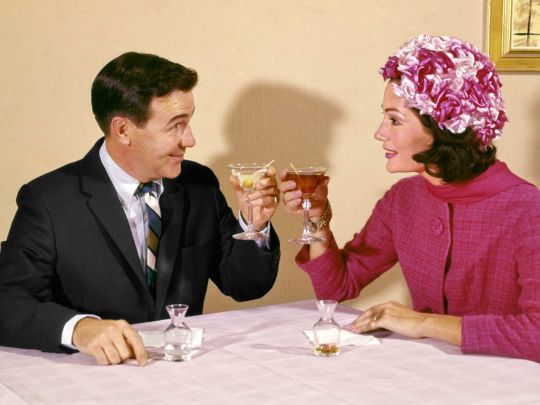
H. Armstrong Roberts/ClassicStock/Getty Images
The best shakers, strainers, bar spoons, jiggers, and more, from the Strategist
So you finally found the bar cart of your dreams, and you’ve loaded it up with your favorite liquor. While those are two very important steps to curating an at-home bar, to really make your setup recall that of your favorite watering hole, you’re going to want to add some barware and cocktail equipment. But that can be an intimidating task, especially if you’ve had more experience drinking cocktails than making them. The good news is that you don’t have to spend a lot of money. “Most people in their home bar really don’t need that many tools,” advises Joaquín Simó, a partner at New York City’s Pouring Ribbons who was named Tales of the Cocktail’s American Bartender of the Year in 2012. “I say you start with the absolute basics and concentrate on the things that you like to use.”
If you’re in a pinch, Martin Hudak, a bartender at Maybe Sammy, says you can always use tools you may already have on hand: “For your shaken cocktails, you can use empty jam jars or a thermos flask. For measuring, spoons and cups, and for stirring, any spoon or back of a wooden ladle.” But Stacey Swenson, the head bartender at Dante (which currently holds the No. 1 spot on the World’s 50 Best Bars list), notes that if you’re going to put stuff on display, you might want gear that’s both practical and stylish. “You want something that’s functional and also something that’s pretty,” she says. “If you’re putting it on your bar cart, you kind of put on a show for your guests.” With the help of Simó, Hudak, Swenson, and 28 other experts, we’ve put together the below list of essential gear for any cocktail-lover’s home bar.
Editor’s note: If you want to support service industry workers who have been impacted by the coronavirus closures, you can donate to the Restaurant Workers’ Community Foundation, which has set up a COVID-19 Crisis Relief Fund, or One Fair Wage, which has set up an Emergency Coronavirus Tipped and Service Worker Support Fund. We’ve also linked to any initiatives the businesses mentioned in this story have set up to support themselves amid the coronavirus pandemic.
Shakers
Best Overall Shaker
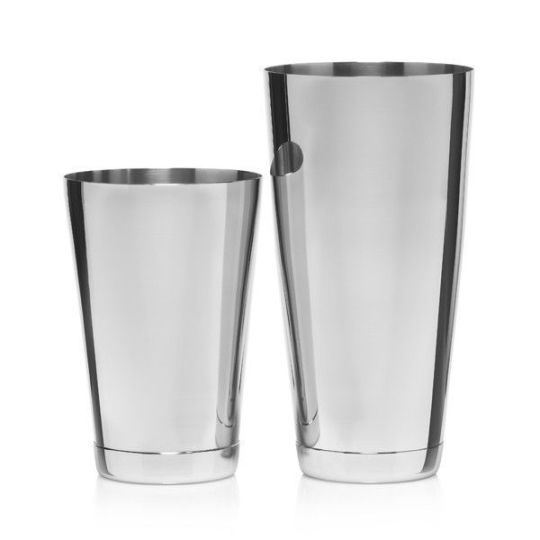
Cocktail Kingdom Koriko Weighted Shaking Tin Set
According to Simó, all shakers “technically do the same thing, and there are very cheap and very nice versions,” so there’s really no superior option when it comes to function. That said, many professional bartenders use Boston-style shakers, which are basically two cups that fit into each other and form a tight seal to keep liquid from splashing all over you. “If you want to look like a bartender at Death & Co. or PDT, and you want the same kit, then you’re probably going to go metal-on-metal,” or “tin-on-tin,” Simó notes. Six of our experts recommend these weighted tin-on-tin shakers — which come in a range of finishes, including copper and silver — from Cocktail Kingdom, a brand that nearly every bartender we spoke to praised for its durable, well-designed barware. Grand Army’s beverage director, Brendan Biggins, and head bartender, Robby Dow, call this “the gold standard” of shaking tins. “Behind the bar, there’s almost nothing worse than shaker tins that don’t seal well or don’t separate easily,” explains Krissy Harris, the beverage director and owner of Jungle Bird in Chelsea. “The Koriko Weighted Shaking tins seal perfectly every time and easily release,” she says. And because they’re weighted, they’re less likely to fall over and spill.
Best shaker for beginners
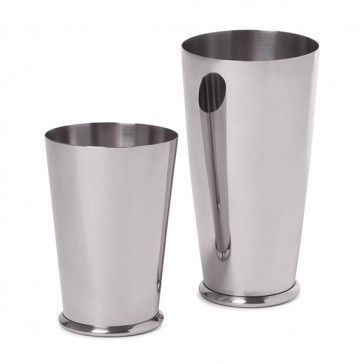
Cocktail Kingdom Leopold Weighted Shaking Tins Set
While most bartenders use Cocktail Kingdom’s Koriko tins, bartender Tim Cooper, who is also the head of brand advocacy for Fords Gin, says that the Leopold shaker is his favorite. “In my experience, the tins are easier to separate than the Koriko’s and feel a touch lighter, as well,” he says. “They’re simply more efficient,” adds Cooper, which is why he says this is a great option for the at-home bartender who’s not well versed on using shaker tins.
Best shaker with a built-in strainer
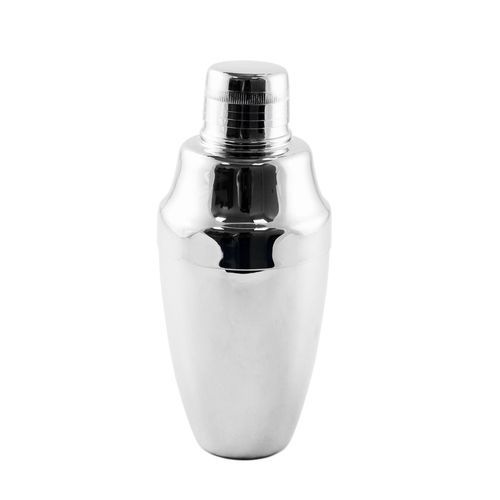
Yukiwa Stainless Steel Cobbler Cocktail Shaker
For some people, a two-piece setup like the above shakers might be tricky to use comfortably. “Say you’re a petite female — if you have very small hands, then maybe using a Boston-style shaker may be a little harder,” explains Simó. In that case, a cobbler shaker may be the better choice, because it’s smaller than a Boston-style shaker and thus easier to hold. The other convenient part of a cobbler-style shaker is that the strainer is already built into the lid, so you don’t necessarily have to spring for an additional tool. Karen Lin, a certified sommelier, sake expert, and the executive general manager of Tsukimi, suggests this shaker from Japanese barware brand Yukiwa. “The steel is very sturdy, and the shape fits perfectly in my hands,” she says. “It is also designed well so you can take it apart easily to clean.”
Mixing glasses
Best overall mixing glass
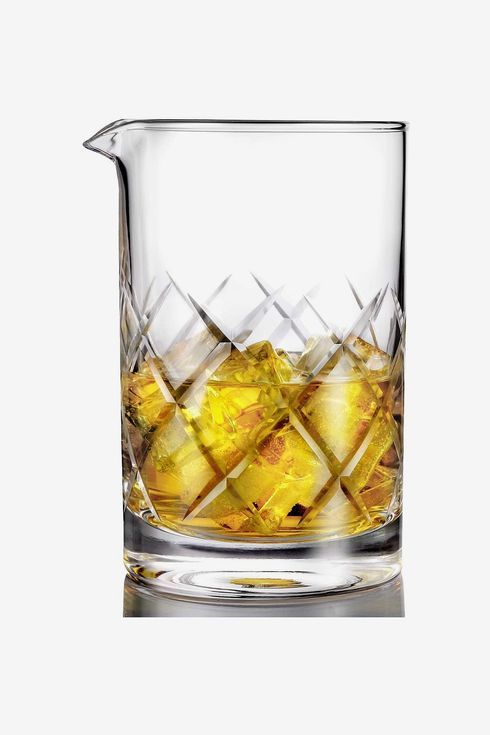
Hiware Professional Cocktail Mixing Glass
You know how James Bond always ordered his martinis shaken, not stirred? Well, if you were to ignore Mr. Bond’s order and make a stirred martini — or any other stirred cocktail, like a Negroni or a Manhattan — you’d set aside the shaker to use a mixing beaker instead. A mixing beaker is essentially a large vessel in which you dump your liquors and mix your drink. And though you can purchase handsome crystal ones for hundreds of dollars, both Simó and Swenson agree that they’re kind of superfluous for a basic bar kit. “I don’t think you should spend any more than $25 on a mixing glass,” says Swenson. Harris agrees, saying that since they are the most broken item behind the bar, you should stick to a well-priced option like this mixing glass from Hiware that “doesn’t have a seam, so it’s stronger and very attractive.”
Best nontraditional mixing glass
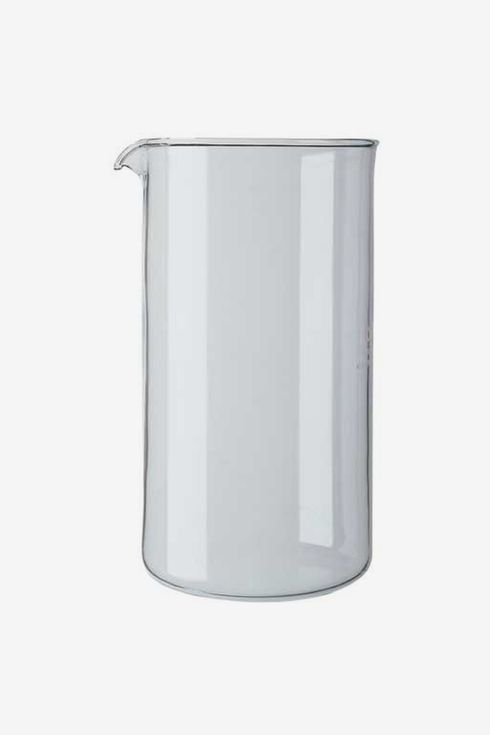
Bodum Replacement Beaker French Press, Replacement 12 Oz Clear Glass
One of Simó’s hacks to getting a glass mixing beaker for not that much money is to use the glass piece from a French press, which is something else you might already own. If you want a dedicated one for your bar cart (that could serve as a backup for your French press), he says you can buy a replacement glass like this one, which has a capacity that is particularly useful if you’re making drinks for a lot of people. “I generally will take one or two of the big guys with me when I’m doing events, because then I can stir up five drinks in one, and it’s really convenient,” Simó explains.
Best Pitcher
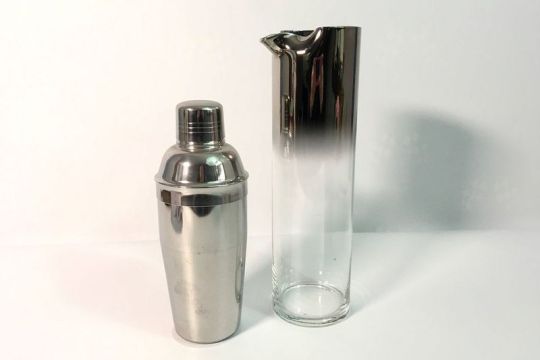
My Vintage Antique Shop Retro Martini Pitcher
According to Paul McGee, a co-owner of Lost Lake in Chicago, “finding vintage martini pitchers is very easy, and they are perfect for making large batches of cocktails.” Plus, they’ll look more visually striking on your bar cart. This one is even pretty enough to use as a vase when it’s not filled with punch. The photo shows the pitcher next to a strainer, but you’re only getting the pitcher for the price shown.
Bar Spoons
Best Japanese-style bar spoon
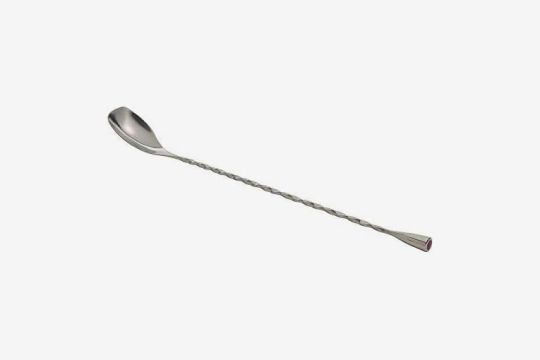
Twisted Bar Spoon by Modern Mixologist
If you’re making a stirred drink, a mixing or bar spoon is also necessary. “Three basic styles exist: the American bar spoon has a twisted handle and, usually, a plastic cap on the end, the European bar spoon has a flat muddler/crusher, and the Japanese bar spoon is heavier, with a weighted teardrop shape opposite the bowl,” explains Joe Palminteri, the director of food and beverage at Hamilton Hotel’s Via Sophia and Society. None of our experts recommended specific American-style bar spoons, but Simó told us that one of his favorite Japanese-style spoons is this one made by bartender Tony Abou-Ganim’s Modern Mixologist brand. “It’s got a really nice, deep bowl to it, which means you’re able to measure a nice, level teaspoon” without searching through your drawers, according to him. Simó continues, “The little top part of it has a nice little weight to it, but it’s not too bulky. So it gives you a really nice balance as you’re moving the mixing spoon around,” making your job a little easier.
Best European-style bar spoon
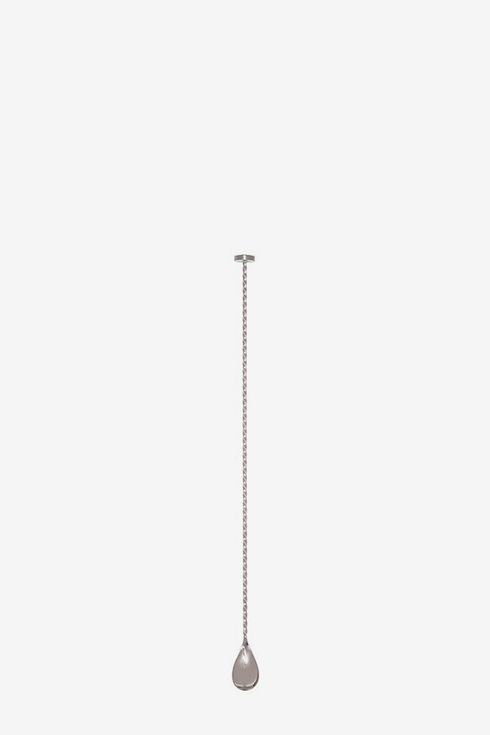
Cocktail Kingdom Muddler Barspoon, Silver-Plated
Should your at-home bartending require a lot of muddling, Swenson recommends getting a European-style spoon like this, which he says will still allow you to stir while eliminating the need to buy a dedicated muddler. “You can actually use the top of the spoon to crush a sugar cube if you wanted to for your old-fashioned. I have one of those, so I don’t have to have two tools; I’ve got both of them right there.”
Strainers
Best overall strainer
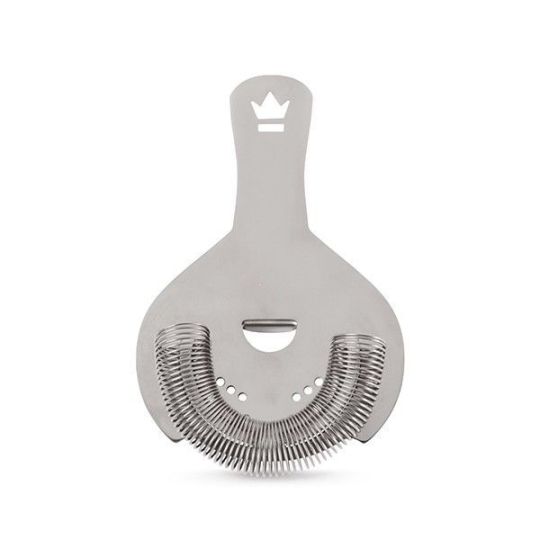
Cocktail Kingdom Buswell 4-Prong Hawthorne Strainer
You don’t necessarily need a strainer if you’re using a cobbler shaker, since it’s already got a strainer built into the lid. But if you’re using a Boston-style shaker, you should get what’s called a Hawthorne strainer to make sure the ice you used to chill your drink doesn’t end up in your glass and dilute the cocktail. Three experts recommend this one, including Lynnette Marrero, the beverage director of Llama Inn and Llama-San and the co-founder of Speed Rack, who says it’s her absolute favorite because “it is light and easy to clutch and close correctly.” If you choose to buy this Hawthorne strainer, Simó also recommends getting “the replacement springs that Cocktail Kingdom sells,” telling us they’re a good way to give a worn-out strainer a face-lift. “They’re really, really nice and tight, and you can generally slip them into any Hawthorne strainer that you have.”
Best less expensive strainer
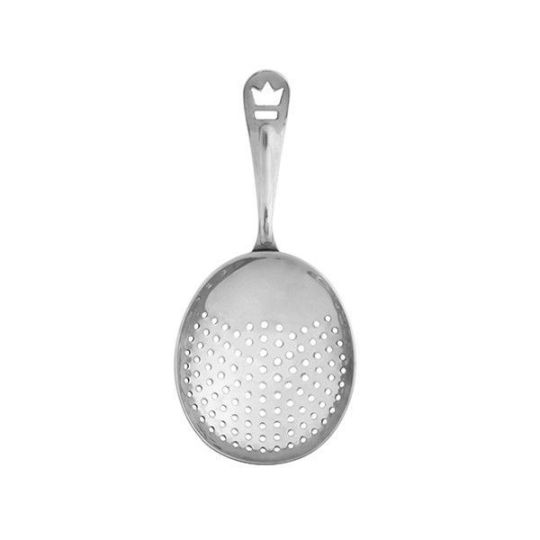
Cocktail Kingdom Julep Strainer
A slightly less expensive strainer is this Cocktail Kingdom julep strainer that three of our experts — bartender Random Ward; Padraig Confrey, the beverage director at Grupo Gitano; and Harris — also recommend. Generally, julep strainers will offer a better fit than Hawthorne strainers if you’re using a mixing glass to make your drinks. According to Cohen, a julep strainer can work equally well in the kitchen, because it “doubles as an ice scoop if needed, too.”
Jiggers
Best overall jigger
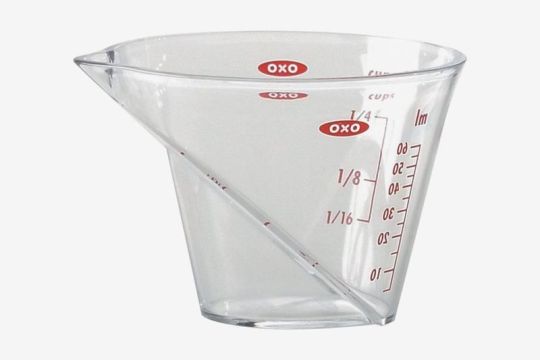
OXO Good Grips Angled Measuring Cup, Mini, Clear
A jigger is what you use to measure the liquor into the shaker or mixing glass. A hyperfunctional, albeit nontraditional-looking, option is the mini measuring cup from OXO. “I know some bartenders, including the ones at Drink in Boston, one of the best bars in the country, swear by those graduated OXO ones because they love the ability to read them from both the sides and the top,” explains Simó. “You can measure in tablespoons or ounces or milliliters, and it’s all on the same jigger.” Part-time bartender Jillian Norwick and Ward both love it too and keep the stainless steel version on hand (which looks a little nicer when left out). Noriwck adds that she’s in good company: “The peeps at Bon Appétit love it.”
Best stepped jigger
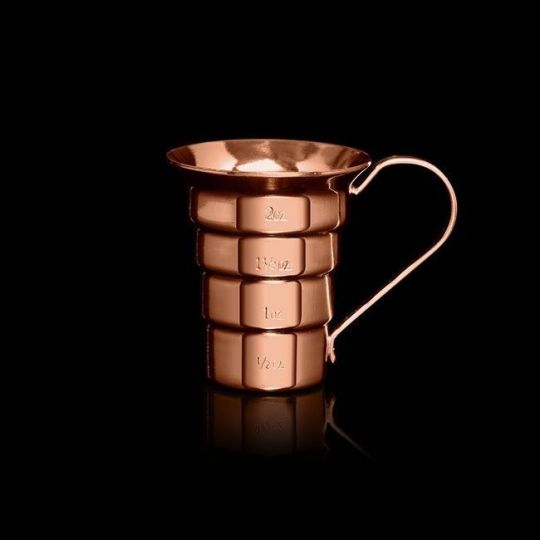
Cocktail Kingdom Stepped Copper Jigger
This fancy-looking jigger combines the functional appeal of the OXO measuring cup (it’s basically a cup that grows wider to accommodate different amounts of liquid) with the aesthetic appeal of a classic bar tool. It also makes measuring a snap: “This handy measuring tool is super-easy to use and enables the imbiber to essentially build all the ingredients of a drink in one go,” says Confrey.
Best traditional jigger
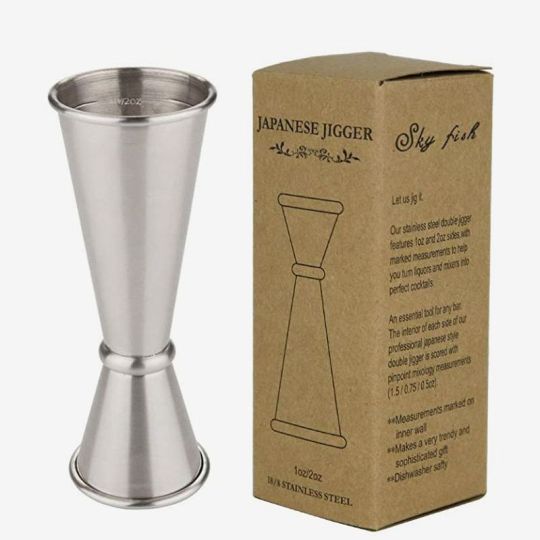
Viking Japanese-Style Jigger
If you’re going for a more classic look but still want something practical, Simó recommends this double-sided metal jigger that has a one-ounce cup on one side and a two-ounce cup on the other. The one-ounce side on this strainer also has a half- and three-quarter-ounce lines etched into it to make it even more precise. “That gives you a lot of wiggle room” and will allow you to measure for most basic cocktails, Simó says. “From there, you really just have to learn what a quarter-ounce looks like in there, and you’re pretty much good to go.”
Best Leopold jigger
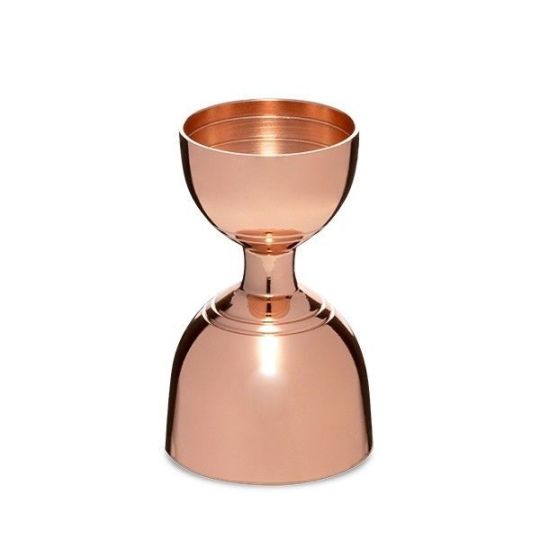
Cocktail Kingdom Leopold Jigger
Biggens, Dowe, and Swenson prefer a Leopold jigger, which has a unique bell shape (with one bell holding an ounce, and the other two ounces) as well as lines etched on the inside marking both quarter- and half-ounces. “They’re really easy to hold and they have some weight to them,” Swenson adds. “Somebody who’s not really experienced using a jigger is going to be fine with something with a little bit more weight to it. And they look cool.”
Glassware
Best collins/highball glasses
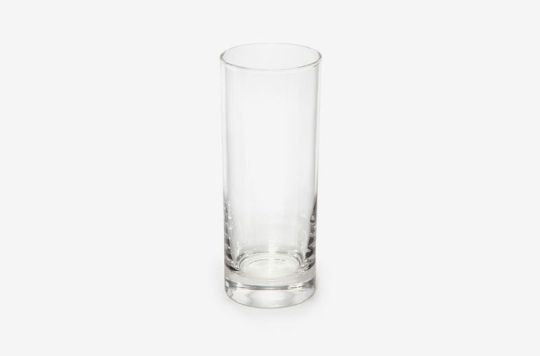
Cocktail Kingdom Buswell Collins Glass, 12-Ounces
Though it’s easy to want to get a different type of glass for every type of drink you make, that’s really unnecessary when you’re first starting out. According to Simó, “You can make 90 percent of drinks into a good, all-purpose cocktail glass like a rocks or a collins glass.” (While this section contains our bartenders’ favorite glasses, if you want to shop around, you can find most of these styles at various price points in our list of the best drinking glasses.) A collins — or highball — glass is the one that looks like a chimney, and generally you’re looking for something that’s about 12 ounces, like these collins glasses from bartender-favorite brand Cocktail Kingdom. “You don’t want a 16-ounce Collins glass because you’re going to be hammered after your second Tom Collins,” advises Simó.
Best rocks glasses
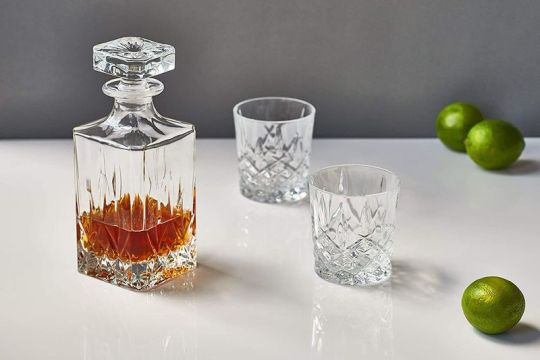
Marquis by Waterford Markham Double Old Fashioned Glasses
For a rocks glass, Simó says the ideal size is between eight and ten ounces. “That’s enough where you could put a decent-size chunk of ice in there if you like making the fancy ice,” he explains. This set of four rocks glasses recommended by Theo Lieberman, the beverage director of 232 Bleecker, is slightly larger at 11 ounces each (more room for fancy ice), and he says they’re durable, machine-washable, and look good to boot. “No one likes taking all the time to make a cocktail and then just putting in a boring glass,” he says.
Best coupe glasses
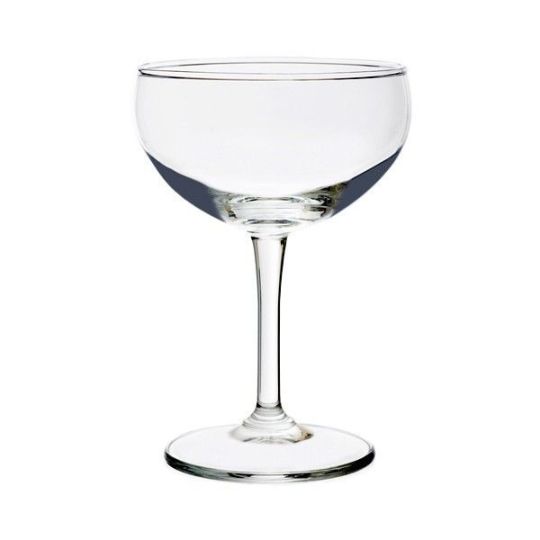
Cocktail Kingdom Leopold Coupe Glass
If you’re looking for glassware beyond the basic collins and rocks glasses, Swenson suggests adding some coupe, or bell-shaped, glasses to your setup, because they’re more forgiving than a V-shaped martini glass (which, she adds, are “super out of style” these days). “The curve on a coupe holds the liquid in a little bit more, so if you get jostled, the liquid is more likely to slosh within the glass but stay in the glass,” Swenson explains. “They’re sleek, they’re smaller, and they look a lot classier than a martini glass.” A coupe glass should be somewhere between six and eight-and-a-half ounces, advises Simó. Nate Fishman, the brand ambassador for Santera Tequila and a bartender at Liquor Lab, likes these six-ounce coupe glasses, telling us that, in his opinion, “everything tastes better out of a coupe glass.”
Bar-tool sets
Best overall bar-tool set
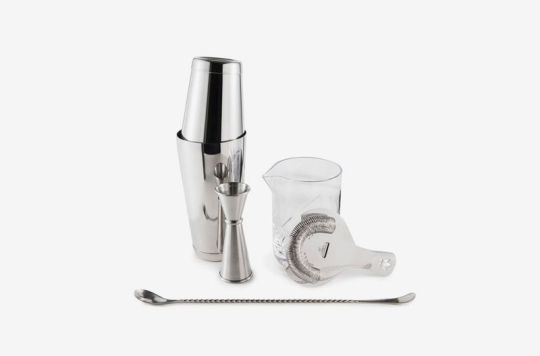
Cocktail Kingdom Essential Cocktail Set
Instead of shopping à la carte, Johnny Swet, the owner of Brooklyn’s Grand Republic Cocktail Club and a bar consultant for Jimmy at the James and The Skylark, says that Cocktail Kingdom sells many of the above tools as part of this set. It includes a spouted mixing glass, weighted metal shaker tins, Japanese jiggers, bar spoons, and a Hawthorne strainer (or everything you need to make a drink at home). If you want to be really fancy, you can even get it in copper or gold.
Best less expensive bar-tool set
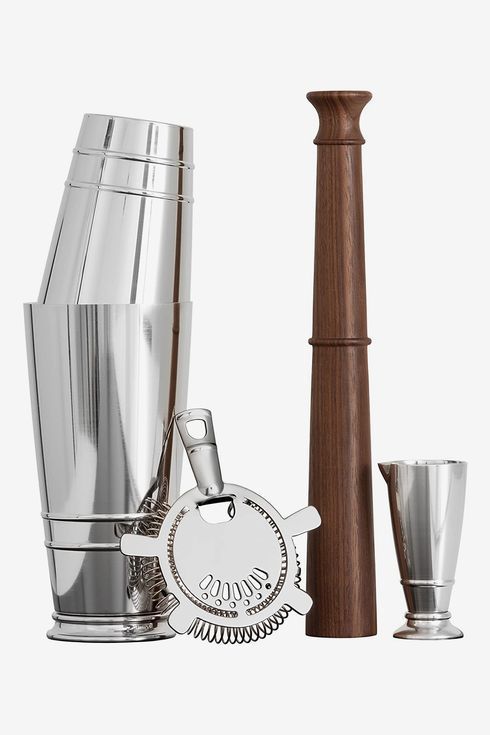
Crafthouse by Fortessa Professional Barware by Charles Joly Gift Set
For a more affordable set, Marrero suggests this really “nice at-home barware set that includes a shaker, muddler, strainer, and jigger.”
More expert-approved gear for your at-home bar
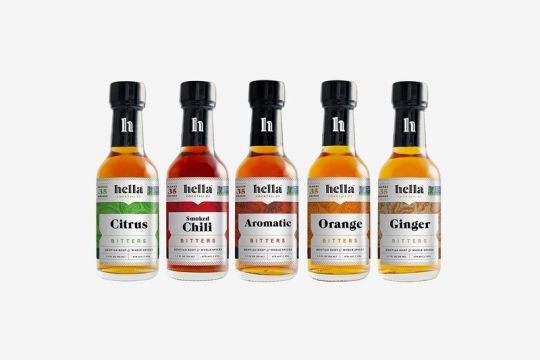
Hella Cocktail Co. Cocktail Bitters Variety Pack
“The world of bitters is massive, and there is so much variety available on the market now,” says Four Seasons Hotel New York beverage director Cara Maldonado. To stock up on several profiles of bitters without breaking the bank on larger individual bottles, Cooper says to try this variety pack, which includes aromatic, citrus, orange, smoked chili, and ginger bitters. “It’s great for the budding home bartender that they can use to experiment with.” Linden Pride, a co-owner of Dante, is also a fan of stocking a bar cart with several types of bitters like those found in this set.
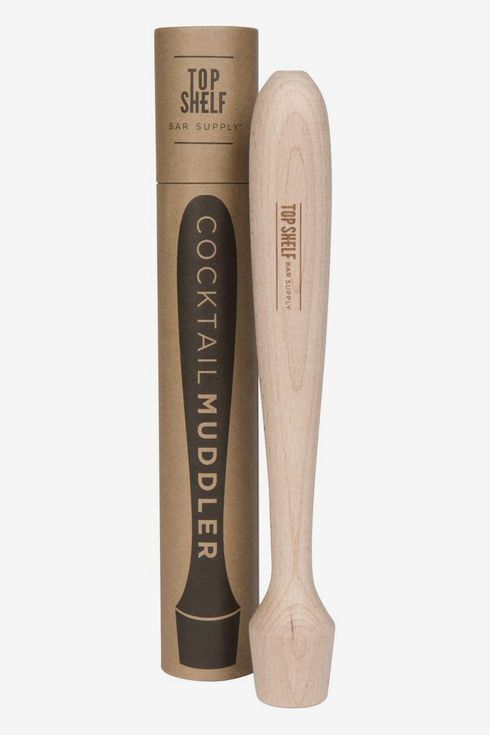
Top Shelf Bar Supply Extra Long Cocktail Muddler
If you do want a proper muddler (not just a muddling spoon) to make drinks that require sugar cubes, herbs, or fruit (like old fashioneds, mojitos, or Brambles), Harris prefers an old-school, wood style. “As long as it’s rinsed and left to dry, it shouldn’t crack,” she says.
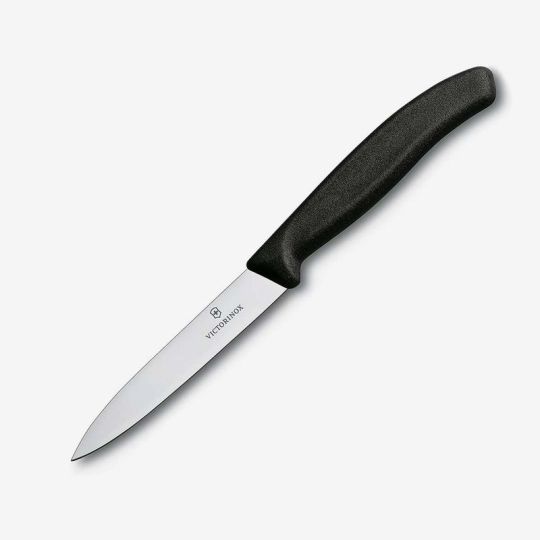
Victorinox Swiss Classic Paring Knife
According to cocktail expert and global brand ambassador for Absolut Elyx Gareth Evans, “When you’re making drinks for friends, remember that the first sip is with the eye, and this is where a good, sharp knife comes in to make sure your garnishes look fresh.” He suggests this non-serrated paring knife from Victorinox, which he says “is the bartender staple around the world.”
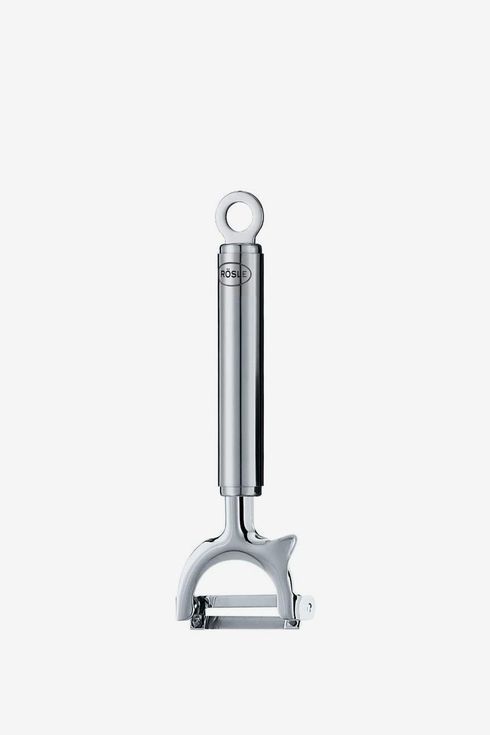
Rösle Stainless Steel Crosswise Swivel Peeler
Though there are some tools that are specifically designed to make garnishes, most home bartenders will be set with a vegetable peeler. Rösle peelers, though more expensive, are “insanely sharp — they are built like tanks,” says Simó, “and they will last for a long time. So if aesthetics matter, those are really, really spectacular, and I would highly advise one.” If aesthetics don’t matter, Biggins says a regular vegetable peeler works just as well, naming the simple, Strategist-approved vegetable peelers from Swiss kitchenware company Kuhn Rikon as a favorite (Norwick and Dowe are both fans too).
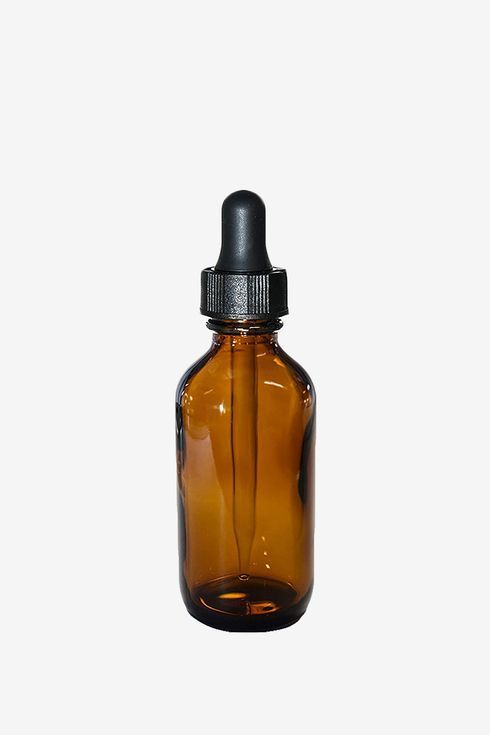
GBO Amber Boston Round with Black Glass Dropper
Kris Peterson of Chicago’s Mordecai and Hush Money calls these glass droppers “indispensable to cocktails,” because they allow you to make drinks with more precision. “Dasher bottles can sometimes be clumsy and inconsistent,” he explains, adding that droppers are especially useful with ingredients like crème de violette or maraschino or Chartreuse that can take over a drink without a light touch.
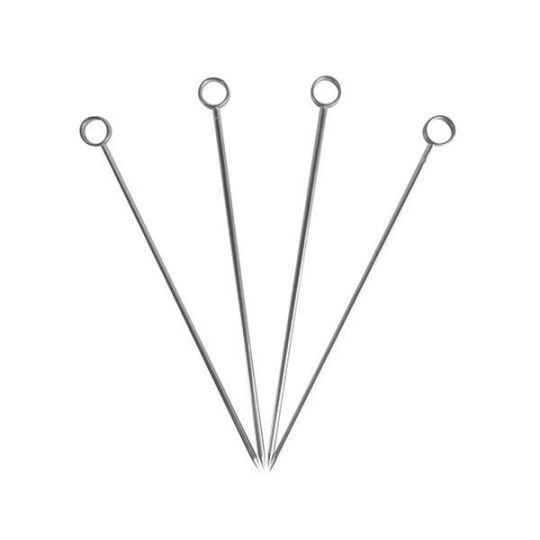
Cocktail Kingdom Stainless Steel Cocktail Picks
For garnishes, Paula November, the event vice president of Reed Exhibitions and Bar Convent Brooklyn, loves these sleek-looking, reusable picks for topping off a cocktail.
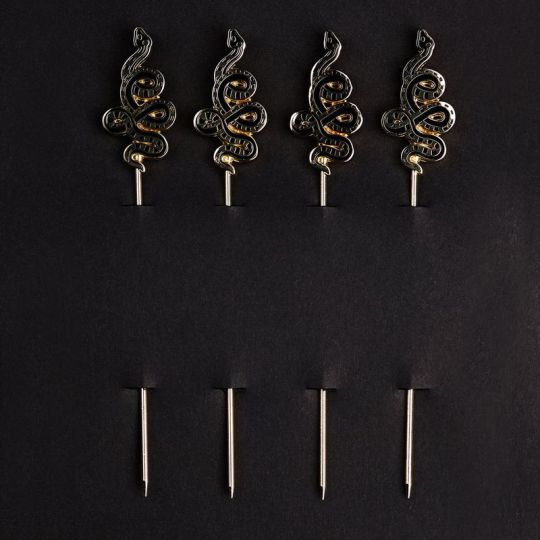
Love and Victory Snake Cocktail Picks
If you’re looking for a pick with personality (that isn’t an umbrella), Katipai Richardson-Wilson, the owner of Gowanus bar Dirty Precious, “uses these stylish snake cocktail picks if I’m showing off.” She promises that they’re “guaranteed to kick even the most delicious cocktail up a notch.”
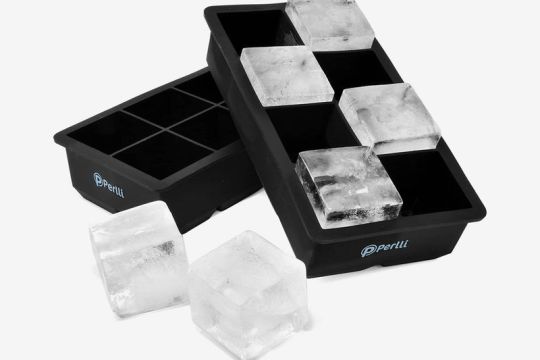
PERLII Ice Cube Trays Large Silicone
“At home, I just have the two-by-two ice-cube trays,” says Swenson. “I don’t stress with making them perfectly clear, but if you want to take the time to do that, that’s totally fine.” According to Simó, basically any style of ice-cube tray you have at home will likely yield better ice than you’d get at an actual bar. “For the most part, you will make better ice in your home freezer using even standard ice molds,” he says. That’s because most commercial ice machines produce ice that “is designed to stack on each other and take up a lot of room, but has so much surface area that it melts really quickly” and dilutes your drink. If you’re looking to add a bartender-approved ice tray to your freezer, Lieberman says that these molds are “easy to use and clean,” and make 2.5x2.5-inch cubes that are great for any cocktail or just whiskey on the rocks.
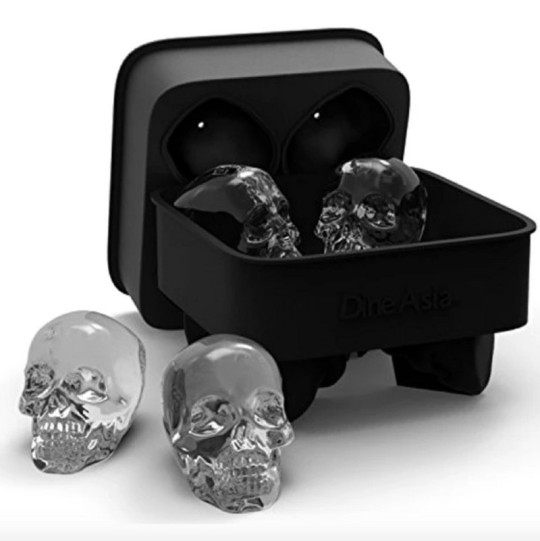
Secret Warehouse Skull Ice Cubes
Those who want ice with a bit of flair should consider these skull-shaped ice cubes that Rob Dietrich, the master distiller at Blackened American Whiskey, uses at home. “The large surface melts slow, offering a less diluted beverage,” he says. His other tip: Use filtered water when making your ice to get the best taste.
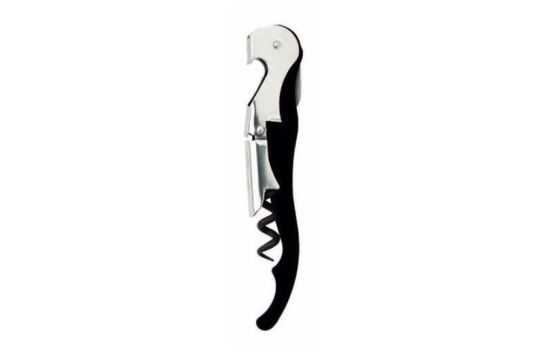
Pulltex Corkscrew, Black
“A good wine key is invaluable,” says Simó, though you don’t necessarily need to spend much money on one. He recommends getting one with a serrated blade (to take the foil off of the bottle) and coated coil, because it’ll go into the cork more smoothly. “The kind that have the hinged little portion that you can get halfway through the pull and then re-lock it to get the other half in, those are very forgiving because it gives you two different angles at which to get the cork out perfectly vertically,” he adds.
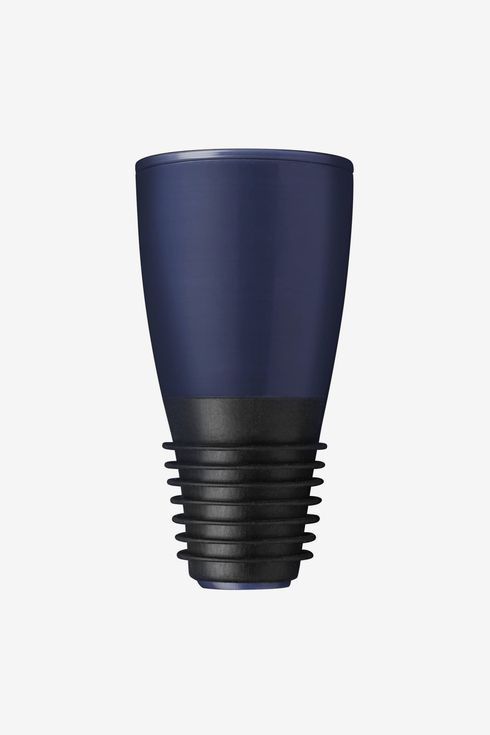
Repour Wine Saver
Should you be eyeing an expensive Coravin to preserve any wine bottles you uncork at home, Matt Crafton, a winemaker at Chateau Montelena, says this RePour wine saver does good a job at keeping your unfinished bottles fresh for a fraction of the cost. “They’re inexpensive, dead simple, and effective.”
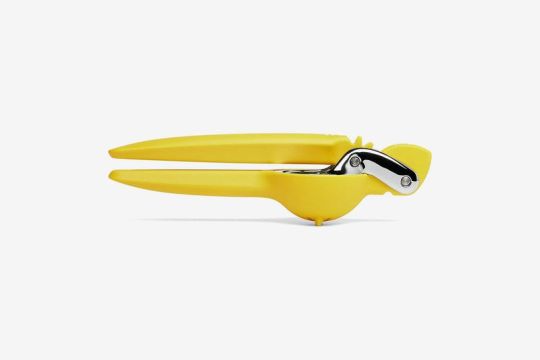
Chef’n FreshForce Citrus Juicer
“The only way to get good lemon and lime juice is to take a small, round, fresh green or yellow thing, cut it through the equator, and then put it into a juicer and ream it and use it that day,” says Simó. “You can’t use it the next day. It gets really bitter and oxidized and gross.” That’s why he says having a handheld juicer is so important if you’re trying to up your home-cocktail game. Ivy Mix — the owner of Leyenda in Brooklyn, a co-founder of the all-female bartending competition Speed Rack, and the author of the forthcoming book Spirits of Latin America — agrees: “Having a fantastic juicer on hand is a must.” Biggins and Dowe say this handheld juicer is the “best of the best,” because it’s efficient, sturdy, and gets the most juice out of your citrus. If you want something more powerful, Brian Evans, the director of bars at Sunday Hospitality, says an “easy-to-operate beast” like the Breville electric juicer will up your mixology game a notch by allowing you to juice vegetables and fruits, instead of just simple citrus.
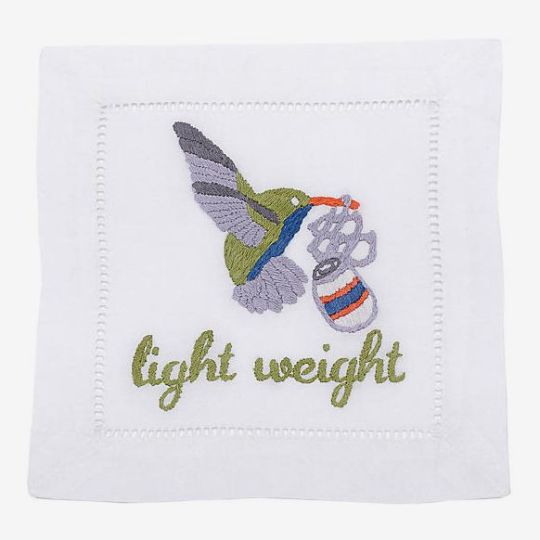
August Morgan Lightweight Cocktail Napkins
“For useful décor, I love to serve drinks on vintage cocktail napkins,” says Allen Katz, a co-founder of New York Distilling Company. “They are a great escape and a conversation piece at the same time.” Vintage linens (or anything) are typically one-of, and Katz did not name a favorite style or seller, so if you’re looking for a napkin that doubles as a conversation starter, might we suggest these embroidered ones from August Morgan, which contributor Chloe Malle says should appeal to “shameless pun-thusiasts.”

Cocktail Codex
Just like you keep a coffee table book in the living room and a cookbook in the kitchen, you can display a cocktail book on your bar cart. Evans calls this “one of the most invaluable cocktail books ever released,” as well as a “treasure trove like no other.” Cocktail Codex is a James Beard Award–winning book that “lays out a wide spectrum of techniques, flavor pairings, and spirits knowledge that really speak to the professional mixologist as effectively as the casual home bartender,” he explains.
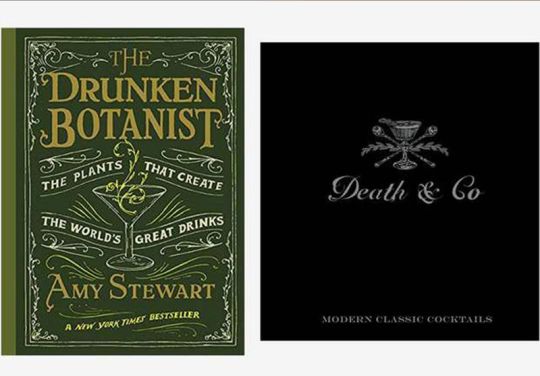
“There are endless books on the subject of cocktails, and I want them all,” says Maldonado. She has a rotation of “informative and beautiful” tomes that she keeps on her own home bar, including Death & Co and The Drunken Botanist as well as Cocktail Codex. “Friends love thumbing through them” while she entertains, she adds.
Vox Media has affiliate partnerships. These do not influence editorial content, though Vox Media may earn commissions for products purchased via affiliate links. For more information, see our ethics policy.
from Eater - All https://ift.tt/2yM8WEd https://ift.tt/39ULQIj

H. Armstrong Roberts/ClassicStock/Getty Images
The best shakers, strainers, bar spoons, jiggers, and more, from the Strategist
So you finally found the bar cart of your dreams, and you’ve loaded it up with your favorite liquor. While those are two very important steps to curating an at-home bar, to really make your setup recall that of your favorite watering hole, you’re going to want to add some barware and cocktail equipment. But that can be an intimidating task, especially if you’ve had more experience drinking cocktails than making them. The good news is that you don’t have to spend a lot of money. “Most people in their home bar really don’t need that many tools,” advises Joaquín Simó, a partner at New York City’s Pouring Ribbons who was named Tales of the Cocktail’s American Bartender of the Year in 2012. “I say you start with the absolute basics and concentrate on the things that you like to use.”
If you’re in a pinch, Martin Hudak, a bartender at Maybe Sammy, says you can always use tools you may already have on hand: “For your shaken cocktails, you can use empty jam jars or a thermos flask. For measuring, spoons and cups, and for stirring, any spoon or back of a wooden ladle.” But Stacey Swenson, the head bartender at Dante (which currently holds the No. 1 spot on the World’s 50 Best Bars list), notes that if you’re going to put stuff on display, you might want gear that’s both practical and stylish. “You want something that’s functional and also something that’s pretty,” she says. “If you’re putting it on your bar cart, you kind of put on a show for your guests.” With the help of Simó, Hudak, Swenson, and 28 other experts, we’ve put together the below list of essential gear for any cocktail-lover’s home bar.
Editor’s note: If you want to support service industry workers who have been impacted by the coronavirus closures, you can donate to the Restaurant Workers’ Community Foundation, which has set up a COVID-19 Crisis Relief Fund, or One Fair Wage, which has set up an Emergency Coronavirus Tipped and Service Worker Support Fund. We’ve also linked to any initiatives the businesses mentioned in this story have set up to support themselves amid the coronavirus pandemic.
Shakers
Best Overall Shaker

Cocktail Kingdom Koriko Weighted Shaking Tin Set
According to Simó, all shakers “technically do the same thing, and there are very cheap and very nice versions,” so there’s really no superior option when it comes to function. That said, many professional bartenders use Boston-style shakers, which are basically two cups that fit into each other and form a tight seal to keep liquid from splashing all over you. “If you want to look like a bartender at Death & Co. or PDT, and you want the same kit, then you’re probably going to go metal-on-metal,” or “tin-on-tin,” Simó notes. Six of our experts recommend these weighted tin-on-tin shakers — which come in a range of finishes, including copper and silver — from Cocktail Kingdom, a brand that nearly every bartender we spoke to praised for its durable, well-designed barware. Grand Army’s beverage director, Brendan Biggins, and head bartender, Robby Dow, call this “the gold standard” of shaking tins. “Behind the bar, there’s almost nothing worse than shaker tins that don’t seal well or don’t separate easily,” explains Krissy Harris, the beverage director and owner of Jungle Bird in Chelsea. “The Koriko Weighted Shaking tins seal perfectly every time and easily release,” she says. And because they’re weighted, they’re less likely to fall over and spill.
Best shaker for beginners

Cocktail Kingdom Leopold Weighted Shaking Tins Set
While most bartenders use Cocktail Kingdom’s Koriko tins, bartender Tim Cooper, who is also the head of brand advocacy for Fords Gin, says that the Leopold shaker is his favorite. “In my experience, the tins are easier to separate than the Koriko’s and feel a touch lighter, as well,” he says. “They’re simply more efficient,” adds Cooper, which is why he says this is a great option for the at-home bartender who’s not well versed on using shaker tins.
Best shaker with a built-in strainer

Yukiwa Stainless Steel Cobbler Cocktail Shaker
For some people, a two-piece setup like the above shakers might be tricky to use comfortably. “Say you’re a petite female — if you have very small hands, then maybe using a Boston-style shaker may be a little harder,” explains Simó. In that case, a cobbler shaker may be the better choice, because it’s smaller than a Boston-style shaker and thus easier to hold. The other convenient part of a cobbler-style shaker is that the strainer is already built into the lid, so you don’t necessarily have to spring for an additional tool. Karen Lin, a certified sommelier, sake expert, and the executive general manager of Tsukimi, suggests this shaker from Japanese barware brand Yukiwa. “The steel is very sturdy, and the shape fits perfectly in my hands,” she says. “It is also designed well so you can take it apart easily to clean.”
Mixing glasses
Best overall mixing glass

Hiware Professional Cocktail Mixing Glass
You know how James Bond always ordered his martinis shaken, not stirred? Well, if you were to ignore Mr. Bond’s order and make a stirred martini — or any other stirred cocktail, like a Negroni or a Manhattan — you’d set aside the shaker to use a mixing beaker instead. A mixing beaker is essentially a large vessel in which you dump your liquors and mix your drink. And though you can purchase handsome crystal ones for hundreds of dollars, both Simó and Swenson agree that they’re kind of superfluous for a basic bar kit. “I don’t think you should spend any more than $25 on a mixing glass,” says Swenson. Harris agrees, saying that since they are the most broken item behind the bar, you should stick to a well-priced option like this mixing glass from Hiware that “doesn’t have a seam, so it’s stronger and very attractive.”
Best nontraditional mixing glass

Bodum Replacement Beaker French Press, Replacement 12 Oz Clear Glass
One of Simó’s hacks to getting a glass mixing beaker for not that much money is to use the glass piece from a French press, which is something else you might already own. If you want a dedicated one for your bar cart (that could serve as a backup for your French press), he says you can buy a replacement glass like this one, which has a capacity that is particularly useful if you’re making drinks for a lot of people. “I generally will take one or two of the big guys with me when I’m doing events, because then I can stir up five drinks in one, and it’s really convenient,” Simó explains.
Best Pitcher

My Vintage Antique Shop Retro Martini Pitcher
According to Paul McGee, a co-owner of Lost Lake in Chicago, “finding vintage martini pitchers is very easy, and they are perfect for making large batches of cocktails.” Plus, they’ll look more visually striking on your bar cart. This one is even pretty enough to use as a vase when it’s not filled with punch. The photo shows the pitcher next to a strainer, but you’re only getting the pitcher for the price shown.
Bar Spoons
Best Japanese-style bar spoon

Twisted Bar Spoon by Modern Mixologist
If you’re making a stirred drink, a mixing or bar spoon is also necessary. “Three basic styles exist: the American bar spoon has a twisted handle and, usually, a plastic cap on the end, the European bar spoon has a flat muddler/crusher, and the Japanese bar spoon is heavier, with a weighted teardrop shape opposite the bowl,” explains Joe Palminteri, the director of food and beverage at Hamilton Hotel’s Via Sophia and Society. None of our experts recommended specific American-style bar spoons, but Simó told us that one of his favorite Japanese-style spoons is this one made by bartender Tony Abou-Ganim’s Modern Mixologist brand. “It’s got a really nice, deep bowl to it, which means you’re able to measure a nice, level teaspoon” without searching through your drawers, according to him. Simó continues, “The little top part of it has a nice little weight to it, but it’s not too bulky. So it gives you a really nice balance as you’re moving the mixing spoon around,” making your job a little easier.
Best European-style bar spoon

Cocktail Kingdom Muddler Barspoon, Silver-Plated
Should your at-home bartending require a lot of muddling, Swenson recommends getting a European-style spoon like this, which he says will still allow you to stir while eliminating the need to buy a dedicated muddler. “You can actually use the top of the spoon to crush a sugar cube if you wanted to for your old-fashioned. I have one of those, so I don’t have to have two tools; I’ve got both of them right there.”
Strainers
Best overall strainer

Cocktail Kingdom Buswell 4-Prong Hawthorne Strainer
You don’t necessarily need a strainer if you’re using a cobbler shaker, since it’s already got a strainer built into the lid. But if you’re using a Boston-style shaker, you should get what’s called a Hawthorne strainer to make sure the ice you used to chill your drink doesn’t end up in your glass and dilute the cocktail. Three experts recommend this one, including Lynnette Marrero, the beverage director of Llama Inn and Llama-San and the co-founder of Speed Rack, who says it’s her absolute favorite because “it is light and easy to clutch and close correctly.” If you choose to buy this Hawthorne strainer, Simó also recommends getting “the replacement springs that Cocktail Kingdom sells,” telling us they’re a good way to give a worn-out strainer a face-lift. “They’re really, really nice and tight, and you can generally slip them into any Hawthorne strainer that you have.”
Best less expensive strainer

Cocktail Kingdom Julep Strainer
A slightly less expensive strainer is this Cocktail Kingdom julep strainer that three of our experts — bartender Random Ward; Padraig Confrey, the beverage director at Grupo Gitano; and Harris — also recommend. Generally, julep strainers will offer a better fit than Hawthorne strainers if you’re using a mixing glass to make your drinks. According to Cohen, a julep strainer can work equally well in the kitchen, because it “doubles as an ice scoop if needed, too.”
Jiggers
Best overall jigger

OXO Good Grips Angled Measuring Cup, Mini, Clear
A jigger is what you use to measure the liquor into the shaker or mixing glass. A hyperfunctional, albeit nontraditional-looking, option is the mini measuring cup from OXO. “I know some bartenders, including the ones at Drink in Boston, one of the best bars in the country, swear by those graduated OXO ones because they love the ability to read them from both the sides and the top,” explains Simó. “You can measure in tablespoons or ounces or milliliters, and it’s all on the same jigger.” Part-time bartender Jillian Norwick and Ward both love it too and keep the stainless steel version on hand (which looks a little nicer when left out). Noriwck adds that she’s in good company: “The peeps at Bon Appétit love it.”
Best stepped jigger

Cocktail Kingdom Stepped Copper Jigger
This fancy-looking jigger combines the functional appeal of the OXO measuring cup (it’s basically a cup that grows wider to accommodate different amounts of liquid) with the aesthetic appeal of a classic bar tool. It also makes measuring a snap: “This handy measuring tool is super-easy to use and enables the imbiber to essentially build all the ingredients of a drink in one go,” says Confrey.
Best traditional jigger

Viking Japanese-Style Jigger
If you’re going for a more classic look but still want something practical, Simó recommends this double-sided metal jigger that has a one-ounce cup on one side and a two-ounce cup on the other. The one-ounce side on this strainer also has a half- and three-quarter-ounce lines etched into it to make it even more precise. “That gives you a lot of wiggle room” and will allow you to measure for most basic cocktails, Simó says. “From there, you really just have to learn what a quarter-ounce looks like in there, and you’re pretty much good to go.”
Best Leopold jigger

Cocktail Kingdom Leopold Jigger
Biggens, Dowe, and Swenson prefer a Leopold jigger, which has a unique bell shape (with one bell holding an ounce, and the other two ounces) as well as lines etched on the inside marking both quarter- and half-ounces. “They’re really easy to hold and they have some weight to them,” Swenson adds. “Somebody who’s not really experienced using a jigger is going to be fine with something with a little bit more weight to it. And they look cool.”
Glassware
Best collins/highball glasses

Cocktail Kingdom Buswell Collins Glass, 12-Ounces
Though it’s easy to want to get a different type of glass for every type of drink you make, that’s really unnecessary when you’re first starting out. According to Simó, “You can make 90 percent of drinks into a good, all-purpose cocktail glass like a rocks or a collins glass.” (While this section contains our bartenders’ favorite glasses, if you want to shop around, you can find most of these styles at various price points in our list of the best drinking glasses.) A collins — or highball — glass is the one that looks like a chimney, and generally you’re looking for something that’s about 12 ounces, like these collins glasses from bartender-favorite brand Cocktail Kingdom. “You don’t want a 16-ounce Collins glass because you’re going to be hammered after your second Tom Collins,” advises Simó.
Best rocks glasses

Marquis by Waterford Markham Double Old Fashioned Glasses
For a rocks glass, Simó says the ideal size is between eight and ten ounces. “That’s enough where you could put a decent-size chunk of ice in there if you like making the fancy ice,” he explains. This set of four rocks glasses recommended by Theo Lieberman, the beverage director of 232 Bleecker, is slightly larger at 11 ounces each (more room for fancy ice), and he says they’re durable, machine-washable, and look good to boot. “No one likes taking all the time to make a cocktail and then just putting in a boring glass,” he says.
Best coupe glasses

Cocktail Kingdom Leopold Coupe Glass
If you’re looking for glassware beyond the basic collins and rocks glasses, Swenson suggests adding some coupe, or bell-shaped, glasses to your setup, because they’re more forgiving than a V-shaped martini glass (which, she adds, are “super out of style” these days). “The curve on a coupe holds the liquid in a little bit more, so if you get jostled, the liquid is more likely to slosh within the glass but stay in the glass,” Swenson explains. “They’re sleek, they’re smaller, and they look a lot classier than a martini glass.” A coupe glass should be somewhere between six and eight-and-a-half ounces, advises Simó. Nate Fishman, the brand ambassador for Santera Tequila and a bartender at Liquor Lab, likes these six-ounce coupe glasses, telling us that, in his opinion, “everything tastes better out of a coupe glass.”
Bar-tool sets
Best overall bar-tool set

Cocktail Kingdom Essential Cocktail Set
Instead of shopping à la carte, Johnny Swet, the owner of Brooklyn’s Grand Republic Cocktail Club and a bar consultant for Jimmy at the James and The Skylark, says that Cocktail Kingdom sells many of the above tools as part of this set. It includes a spouted mixing glass, weighted metal shaker tins, Japanese jiggers, bar spoons, and a Hawthorne strainer (or everything you need to make a drink at home). If you want to be really fancy, you can even get it in copper or gold.
Best less expensive bar-tool set

Crafthouse by Fortessa Professional Barware by Charles Joly Gift Set
For a more affordable set, Marrero suggests this really “nice at-home barware set that includes a shaker, muddler, strainer, and jigger.”
More expert-approved gear for your at-home bar

Hella Cocktail Co. Cocktail Bitters Variety Pack
“The world of bitters is massive, and there is so much variety available on the market now,” says Four Seasons Hotel New York beverage director Cara Maldonado. To stock up on several profiles of bitters without breaking the bank on larger individual bottles, Cooper says to try this variety pack, which includes aromatic, citrus, orange, smoked chili, and ginger bitters. “It’s great for the budding home bartender that they can use to experiment with.” Linden Pride, a co-owner of Dante, is also a fan of stocking a bar cart with several types of bitters like those found in this set.

Top Shelf Bar Supply Extra Long Cocktail Muddler
If you do want a proper muddler (not just a muddling spoon) to make drinks that require sugar cubes, herbs, or fruit (like old fashioneds, mojitos, or Brambles), Harris prefers an old-school, wood style. “As long as it’s rinsed and left to dry, it shouldn’t crack,” she says.

Victorinox Swiss Classic Paring Knife
According to cocktail expert and global brand ambassador for Absolut Elyx Gareth Evans, “When you’re making drinks for friends, remember that the first sip is with the eye, and this is where a good, sharp knife comes in to make sure your garnishes look fresh.” He suggests this non-serrated paring knife from Victorinox, which he says “is the bartender staple around the world.”

Rösle Stainless Steel Crosswise Swivel Peeler
Though there are some tools that are specifically designed to make garnishes, most home bartenders will be set with a vegetable peeler. Rösle peelers, though more expensive, are “insanely sharp — they are built like tanks,” says Simó, “and they will last for a long time. So if aesthetics matter, those are really, really spectacular, and I would highly advise one.” If aesthetics don’t matter, Biggins says a regular vegetable peeler works just as well, naming the simple, Strategist-approved vegetable peelers from Swiss kitchenware company Kuhn Rikon as a favorite (Norwick and Dowe are both fans too).

GBO Amber Boston Round with Black Glass Dropper
Kris Peterson of Chicago’s Mordecai and Hush Money calls these glass droppers “indispensable to cocktails,” because they allow you to make drinks with more precision. “Dasher bottles can sometimes be clumsy and inconsistent,” he explains, adding that droppers are especially useful with ingredients like crème de violette or maraschino or Chartreuse that can take over a drink without a light touch.

Cocktail Kingdom Stainless Steel Cocktail Picks
For garnishes, Paula November, the event vice president of Reed Exhibitions and Bar Convent Brooklyn, loves these sleek-looking, reusable picks for topping off a cocktail.

Love and Victory Snake Cocktail Picks
If you’re looking for a pick with personality (that isn’t an umbrella), Katipai Richardson-Wilson, the owner of Gowanus bar Dirty Precious, “uses these stylish snake cocktail picks if I’m showing off.” She promises that they’re “guaranteed to kick even the most delicious cocktail up a notch.”

PERLII Ice Cube Trays Large Silicone
“At home, I just have the two-by-two ice-cube trays,” says Swenson. “I don’t stress with making them perfectly clear, but if you want to take the time to do that, that’s totally fine.” According to Simó, basically any style of ice-cube tray you have at home will likely yield better ice than you’d get at an actual bar. “For the most part, you will make better ice in your home freezer using even standard ice molds,” he says. That’s because most commercial ice machines produce ice that “is designed to stack on each other and take up a lot of room, but has so much surface area that it melts really quickly” and dilutes your drink. If you’re looking to add a bartender-approved ice tray to your freezer, Lieberman says that these molds are “easy to use and clean,” and make 2.5x2.5-inch cubes that are great for any cocktail or just whiskey on the rocks.

Secret Warehouse Skull Ice Cubes
Those who want ice with a bit of flair should consider these skull-shaped ice cubes that Rob Dietrich, the master distiller at Blackened American Whiskey, uses at home. “The large surface melts slow, offering a less diluted beverage,” he says. His other tip: Use filtered water when making your ice to get the best taste.

Pulltex Corkscrew, Black
“A good wine key is invaluable,” says Simó, though you don’t necessarily need to spend much money on one. He recommends getting one with a serrated blade (to take the foil off of the bottle) and coated coil, because it’ll go into the cork more smoothly. “The kind that have the hinged little portion that you can get halfway through the pull and then re-lock it to get the other half in, those are very forgiving because it gives you two different angles at which to get the cork out perfectly vertically,” he adds.

Repour Wine Saver
Should you be eyeing an expensive Coravin to preserve any wine bottles you uncork at home, Matt Crafton, a winemaker at Chateau Montelena, says this RePour wine saver does good a job at keeping your unfinished bottles fresh for a fraction of the cost. “They’re inexpensive, dead simple, and effective.”

Chef’n FreshForce Citrus Juicer
“The only way to get good lemon and lime juice is to take a small, round, fresh green or yellow thing, cut it through the equator, and then put it into a juicer and ream it and use it that day,” says Simó. “You can’t use it the next day. It gets really bitter and oxidized and gross.” That’s why he says having a handheld juicer is so important if you’re trying to up your home-cocktail game. Ivy Mix — the owner of Leyenda in Brooklyn, a co-founder of the all-female bartending competition Speed Rack, and the author of the forthcoming book Spirits of Latin America — agrees: “Having a fantastic juicer on hand is a must.” Biggins and Dowe say this handheld juicer is the “best of the best,” because it’s efficient, sturdy, and gets the most juice out of your citrus. If you want something more powerful, Brian Evans, the director of bars at Sunday Hospitality, says an “easy-to-operate beast” like the Breville electric juicer will up your mixology game a notch by allowing you to juice vegetables and fruits, instead of just simple citrus.

August Morgan Lightweight Cocktail Napkins
“For useful décor, I love to serve drinks on vintage cocktail napkins,” says Allen Katz, a co-founder of New York Distilling Company. “They are a great escape and a conversation piece at the same time.” Vintage linens (or anything) are typically one-of, and Katz did not name a favorite style or seller, so if you’re looking for a napkin that doubles as a conversation starter, might we suggest these embroidered ones from August Morgan, which contributor Chloe Malle says should appeal to “shameless pun-thusiasts.”

Cocktail Codex
Just like you keep a coffee table book in the living room and a cookbook in the kitchen, you can display a cocktail book on your bar cart. Evans calls this “one of the most invaluable cocktail books ever released,” as well as a “treasure trove like no other.” Cocktail Codex is a James Beard Award–winning book that “lays out a wide spectrum of techniques, flavor pairings, and spirits knowledge that really speak to the professional mixologist as effectively as the casual home bartender,” he explains.

“There are endless books on the subject of cocktails, and I want them all,” says Maldonado. She has a rotation of “informative and beautiful” tomes that she keeps on her own home bar, including Death & Co and The Drunken Botanist as well as Cocktail Codex. “Friends love thumbing through them” while she entertains, she adds.
Vox Media has affiliate partnerships. These do not influence editorial content, though Vox Media may earn commissions for products purchased via affiliate links. For more information, see our ethics policy.
from Eater - All https://ift.tt/2yM8WEd via Blogger https://ift.tt/39ULQbh
1 note
·
View note
Text
Is it wrong to expect substance from music in the alternative/punk scene?
The crap thing about becoming successful and/or genuine with a certain type of subgenre, whether it’s pop punk, post hardcore, or metalcore, is that, soon after, a lot of lyrically and musically inferior bands come out to cash in on the trend.
Enter Makeout from Rhode Island. Formed out of the ashes of generic but musically superior post hardcore band Like Monroe, it makes sense that they’ve written with 5SOS’ Ashton Irwin and Calum Hood as Makeout sounds like a 5SOS ripoff that’s trying to be edgier. The key word is “trying”. They're about as edgy as a 13-year-old wearing eyeliner, listening to Brand New, and claiming “It’s not a phase, Mom!”
Take the song “Secrets”. One of three singles from upcoming album “The Good Life”, there’s little to like about it other than an oddly specific but creative insult that says: “go choke on a hot dog from 7-11”. I love a good angry song as much as the next person but I can think of four songs off the top of my head that are lyrically and musically more creative than the tripe that this song is.
The aforementioned Brand New has one of my favorites called “Seventy Times 7”, I Prevail has “Already Dead”, and Set It Off has both “Hypnotized” and “Wolf In Sheep’s Clothing”, “Seventy” has so many “holy shit, did he really just say that?” moments that you have to listen to the song 3 more times just to get the full effect. Some of my favorites include “So don't apologize. I hope you choke and die” and “So, is that what you call a getaway?/Tell me what you got away with/Cause I've seen more spine in jellyfish/I've seen more guts in 11-year-old kids/Have another drink and drive yourself home/I hope there's ice on all the roads/And you can think of me when you forget your seatbelt/And again when your head goes through the windshield/And is that what you call tact?/You're as subtle as a brick in the small of my back/So let's end this call, and end this conversation...”
The lyrics are also self-aware: “As if it happening wasn’t enough, I gotta go and write a song to remind myself how bad it sucked”.
There isn’t a smidge of self-awareness to find anywhere in any of the stuff I’ve heard so far from Makeout.
“Already Dead”, “Hypnotized”, and “Wolf in...” are bound to make the listener say, “well, damn, who pissed y’all off?” with lyrics like “I’d pull the trigger but you’re already dead/if I could bring you back to life/I’d kill you again” and “Wanna add a habit and light about 30 cigarettes? (You should)/You’re only mad about the fact that I put a light to you/basically tracing paper when all we see is right through you!” and finally, “If I could kill you, I would, but it’s illegal in all 50 states. Having said that, burn. in. HELL.”
The music in these songs also creates a foreboding atmosphere what with the hammering drums, angry vocals, and dark sounding guitars.
“Secrets” is so inexcusably juvenile that you’d think a group of 12-15 year olds wrote it, but no, the members of Makeout are 20+. In other words, they’re old enough to know better and should know better, especially with such big names as super producer John Feldmann and Blink-182 drummer Travis Barker working with them. There’s nothing musically enjoyable about it either as it’s acoustic strumming with no variation during the whole song. The cringefest continues for two more minutes after the hot dog line with lyrics like “...’all the money I spent on Sephora while I was on tour and you were with Kevin No more Nobu on my bill, you broke bitch” and “You blew it with your bullshit, you fucking whore/And every time I think of you I'm sick/And I bet you still think that you're the shit”. This is insultingly bad writing and it makes me angry that they exploit every bad millennial stereotype in order to be relatable: “I stayed awake watching porn on my iPhone/It's almost like I don't need you/I wish I knew it was easy as this then it wouldn't have taken me this long to leave you/Postmates me some sushi almost got me feeling human/Sugar daddy, I bet you already got a new one/I'm a do my best to make sure your life stay in ruins/And everybody knows that you're a bitch, say I won't do it.”
This exploitation continues if you take a look at the track list for “The Good Life”:
1. Childish
2 Crazy
3 Lisa
4 Ride It Out
5 Open Minded
6 You Can't Blame Me
7 Clockwork
8 Till We're Gone
9 Salt Lake City Lyrics
10 Secrets
11 Where's My Charger
12 Blast Off
Their first single, “Crazy”, came to my attention when it was on my Spotify playlist, Release Radar. It’s also the only one of Makeout’s singles that won’t have you scrambling for the skip button. It’s catchy and bouncy enough to jam to if you don’t listen to the lyrics too closely. There are less cringe moments than on “Secrets”, but there’s still at least two: “You’ll be out all night then you sleep all day/Gettin' way too high, but I’m fuckin' with it anyway/Maxin’ out my cards when I just got paid/Went and crashed my car/It’s the same shit just a different day!” and “Every time you’re sexin’ me/Feel like I’m about to lose it girl you’re fuckin’ deadly...”
“Ride It Out” is as generic as it gets when it comes to songs about dysfunctional relationships: backing vocals crooning “whoa-oh-oh”, slow, major chord opening, and equally as generic lyrics.
Says the chorus: “Don't let this burn out/just leave your guard down Cause when I dream about you here I wanna ride it out (ride it out)/Know when you fall down/I'll have my arms out/’Cause when you're lying next to me I wanna ride it out (ride it out)...” So romantic. Every girl’s or guy’s dream words (said with extreme sarcasm): “This is basically a shitty situation but I’m too stubborn to let it go.”
The song continues with this: “Breathe you in/The nights we shared I'd like to live again/Seemed like seconds that would never end/Can we pretend?”
The listener is then treated to another unbelievably juvenile lyric: “Stop the clock/Draw our futures in the pavement chalk/Stretch the moments when we lock our eyes/And feel the light again...” The second and third graders I work with LOVE pavement chalk. i think that says everything. In somewhat related and hilariously ironic news, their Genius lyrics page doesn’t have a picture of the band, just a silhouette of a baby crawling on the floor.
If you think I’m being too harsh, listen to these train wrecks for yourself and let me know:
“Secrets”
“Crazy”
“Ride It Out”
I’m also on Twitter and Instagram @ writergirlfl.
#makeout#makeoutband#like monroe#brand new#emo culture#3edgy5me#3edgy5u#alternative culture#punk culture#pop punk#5sos#ripoffs#substance please#bad lyrics#music journalism#blogs#music blogs#secrets#the good life#crazy#ride it out#rise records#i prevail#set it off#subgenre money grabs#money grabs#ick#why#go away makeout
3 notes
·
View notes
Text
NY drinks NY wines: History and hybrids

New York Wines: Disaster in the Beginning
Historians have documented the fact that grapes were first introduced to New York by the Dutch (1647-1664); sadly, the crops failed. A few years later, the French Huguenot settlers in Ulster County tried to plant European varietals (1667) and they too were unsuccessful.

William Robert Prince (1795—1869)
Finally, in 1816 the Isabella grape was planted by William R. Prince (a descendant of Thomas Prince, an early Governor of the Plymouth Colony) in Linnaean Gardens (Queens, NY) and 2 years later (1818), Elijah Fay planted the first vineyard in Chautauqua County.

A few years later (1827) the first commercial vineyard and winery in the Hudson Valley opened (planted by Richard Underhill on Croton Point on the Hudson River). The Underhill’s are considered to be the first dynasty in American viticulture. It is the size and longevity of these vineyards that gives them the right to be considered the real founders of the wine-growing industry in New York.
Two years later (1829), in his rectory garden, the Revered William Bostwick planted the first vineyard in the Finger Lakes (Hammondsport, NY). Bostwick encouraged his neighbors to plant cuttings from the few Isabella and Catawba vines he was growing.

However, it took another decade for the wine industry to go commercial in the Hudson Valley. Finally, in 1839 Jean Jacques opened Blooming Grove (later rebranded as Brotherhood Winery) and by 1853 the Concord grape variety (introduced by Ephraim Bull of Concord, NH) became a popular wine and table grape. The Taylor Wine company entered the industry in 1880, followed by Widmer’s Wine Cellars in 1888 – placing New York on the world’s wine-making map. These enterprises produced sparkling and dessert wines (including ports and sherries), as well as table wines.
Wineries Expand
The Farm Winery Boom took place in the 1960s-1970s with new winery entrepreneurs. The entries included Benmarl Wine company and Cascade Mountain Vineyard (Hudson River Region), with Bully Hill Vineyards and Dr. Konstantin Frank’s Vinifera Wine Cellars in the Finger Lakes.

The Farm Winery Act (1976) opened the door to ownership and operations for a winery to produce less than 50,000 gallons of wine per year and sell directly to the consumer on the farm; today farm wineries can produce up to 150,000 gallons per year and can market wines to restaurants, retail and wholesale trade. As the Act evolved, it allowed winemakers to buy grapes from other New York growers and sell their wines in the same system, as long as the wines were made with 100 percent New York grapes.
Wineries continued to increase (1976-2017), reaching approximately 405, with 302 in Federally recognized viticulture regions: 20 in Lake Erie, 129 in the Finger Lakes, 62 in the Hudson River Region, 76 on Long Island, 7 I along the Niagara Escarpment and 7 in the Champlain Valley of New York with 103 wineries in other areas of the state.
Size Matters
Most new wineries are small, family-operated and focus on limited production of premium varietal table wines with the entire process, from planting of vines to wine marketing, controlled by the family. In addition to winemaking, visitors to the wineries are able to experience tours of the vineyards, and wine tastings and this aspect of the industry attracts 3 million tourists to New York each year.
NY Wine Industry Today
Today, New York is the nation’s third largest wine producing state with average annual production of approximately 20-million gallons. New York has 10 officially recognized viticulture areas that are compared to the French, “appellations of origin” and include Lake Erie, Niagara Escarpment; Finger Lakes; Seneca Lake; Cayuga Lake; Hudson River, Long Island; The Hampton, Long Island; North Fork of Long Island; and Champlain Valley of New York.
8th Annual NY Drinks NY. Workshop Focus

At a recent New York drinks NY wine event, scholars, sommeliers, buyers, sellers, and writers convened to learn about some of the unique hybrid grapes growing in New York State.

NY’s Hybrid Grapes
What is a hybrid grape? Hybrid grapes are grape varieties that are the product of crossing two or more Vitis species. They are also referred to an inter-specific crossing or “Modern Varieties” and have excellent tolerance to powdery mildew, other fungal diseases, nematodes and phylloxera.

New York Hybrid Grapes Presented
At the NY Drinks NY event, Sommelier Pascaline Lepeltier, MS and viticulturalist Mike Colizzi of the Cornell Agriculture Experiment Stations, Geneva, NY, presented a few of New York State’s hybrid grape varieties, including:

Vignoles. Developed by J. F. Ravat, a French hybridizer (1929), Vignole is a cross between Pinot Noir and a Seibel hybrid. Viticulture characteristics include: Hardy, late-ripening and moderately vigorous vine; moderate yielding with small, compact clusters. They are, however, susceptible to powdery mildew and bunch rot and capable of acquiring “noble rot” which, thankfully, produces excellent late harvest wines.
Vilification: Cool, tank fermentation; no malolactic fermentation; no barrel aging. Vignola’s are always finished with at least 1 percent residual sugar and frequently used to make sweet, late-harvest wines. Vignoles present an aromatic and tropical fruit nose but is somewhat one-dimensional and the natural high acidity must be balanced with sweetness. Late harvest wines have a strong aroma of apricot.
Demand for Vignoles is growing due to numerous awards in major competitions of late harvest and ice wines. These grapes can make high quality table wines and consumers are learning that it pairs well with spicier versions of Mexican and Oriental cuisine.

Traminette. (Formerly known as NY65.433.13). Officially introduced at the 4th International Symposium on Cool Climate Viticulture and Enology in Rochester, NY (July 1996), the Traminette is the result of a cross of Janes Serve 23.146 x Gewurztraminer by H.C. Barrett in 1965 at the University of Illinois.
Originally intended to be a table grape with Gewurztraminer flavor characteristics, this grape is distinguished by its superior wine quality combined with good productivity, partial resistance to several fungal diseases and cold hardiness. It is a late mid-season white wine grape that produces wine with pronounced varietal characteristics likened to one of its parents, Gewurztraminer.

Baco Noir. Monsieur Francois Baco (1865- 1947), was a teacher, living in Belus, Landes, Armagnac Province, France (south of Bordeaux). This French-American hybrid grape variety is produced as a red wine in NY State.
Its origins date back to 1894 when Baco crossed Follet Blanche (a traditional grape variety used to make brandies in Armagnac) with an unknown member of the New World’s Vitus riparian family (also known as “riverbank” or “riverside” grapes that are found along the banks of the eastern part of North America from southern Canada to the Gulf of Mexico to the Rocky Mountains). The intention was to create phylloxera-resistant vines that retained their French character. Baco was bred in 1902 and commercially released in 1910.
Light to medium body, with good acidity and a preference for cooler climate, Baco Noir is a grower-friendly alternative to Pinot Noir. If Baco is left on its skins for more than 7 days as it ferments – it can, with care, have many big Bordeaux-like qualities. It has a robust and aromatic flavor – cedar, tobacco, leather and chocolate. The complex fruit flavors include black cherries, black berries and prunes. It may also present herbal notes of black pepper, licorice, cinnamon and eucalyptus.
Baco, made in a lighter style, is reminiscent of a Burgundian Pinot Noir that presents a rich nose whose fruits trigger memories of red raspberries, black raspberries, blueberries, cherries and strawberry jam. The herbal notes include more muted flavors of lavender, black pepper, mint and licorice.
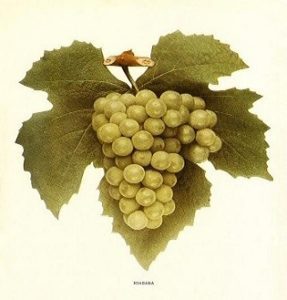
Niagara. This is a light-skinned hybrid variety grown mainly in the northeastern US, particularly around the Great Lakes Region. Created in the NY country of Niagara in the mid-19th century from the Concord grape variety (perhaps a cross between a wild Vitis labrusca variety and an unknow Vitis vinifera variety) and the labrusca Cassady. Wines from Niagara are light and present a “foxy” aroma.
Niagara is a high-yielding grape that is resistant to harsh, continental winters. It can be made into wines as diverse as Burgundian Pinot Noirs, Bordeaux-like Cabernet Sauvignons, light young fall wines or nouveaux, and even rosé. It presents a deep color, lots of berry and plum fruit, and delivers high acid levels that pair well with barbecued meats. It also ages well.

Marechal Foch. The grape is a cross of Gold Riesling and riparia/rupestris hybrid and made by Eugene Kuhlmann of Alsace. Viticulture characteristics include: vigorous and early-ripening, small to moderate yields of small, loose clusters of blue-black grapes. This hybrid is disease resistant and withstands hardy winters although early bud breaks can result in damage to shoots by late spring frosts.
For additional information, visit newyorkstatewinegrapegrowers.org.
© Dr. Elinor Garely. This copyright article, including photos, may not be reproduced without written permission from the author.
Travel News | eTurboNews
Original Article
The post NY drinks NY wines: History and hybrids appeared first on Tripstations.
from Tripstations http://bit.ly/2v4YQJD via IFTTT
0 notes
Quote
H. Armstrong Roberts/ClassicStock/Getty Images The best shakers, strainers, bar spoons, jiggers, and more, from the Strategist So you finally found the bar cart of your dreams, and you’ve loaded it up with your favorite liquor. While those are two very important steps to curating an at-home bar, to really make your setup recall that of your favorite watering hole, you’re going to want to add some barware and cocktail equipment. But that can be an intimidating task, especially if you’ve had more experience drinking cocktails than making them. The good news is that you don’t have to spend a lot of money. “Most people in their home bar really don’t need that many tools,” advises Joaquín Simó, a partner at New York City’s Pouring Ribbons who was named Tales of the Cocktail’s American Bartender of the Year in 2012. “I say you start with the absolute basics and concentrate on the things that you like to use.” If you’re in a pinch, Martin Hudak, a bartender at Maybe Sammy, says you can always use tools you may already have on hand: “For your shaken cocktails, you can use empty jam jars or a thermos flask. For measuring, spoons and cups, and for stirring, any spoon or back of a wooden ladle.” But Stacey Swenson, the head bartender at Dante (which currently holds the No. 1 spot on the World’s 50 Best Bars list), notes that if you’re going to put stuff on display, you might want gear that’s both practical and stylish. “You want something that’s functional and also something that’s pretty,” she says. “If you’re putting it on your bar cart, you kind of put on a show for your guests.” With the help of Simó, Hudak, Swenson, and 28 other experts, we’ve put together the below list of essential gear for any cocktail-lover’s home bar. Editor’s note: If you want to support service industry workers who have been impacted by the coronavirus closures, you can donate to the Restaurant Workers’ Community Foundation, which has set up a COVID-19 Crisis Relief Fund, or One Fair Wage, which has set up an Emergency Coronavirus Tipped and Service Worker Support Fund. We’ve also linked to any initiatives the businesses mentioned in this story have set up to support themselves amid the coronavirus pandemic. Shakers Best Overall Shaker Cocktail Kingdom Koriko Weighted Shaking Tin Set According to Simó, all shakers “technically do the same thing, and there are very cheap and very nice versions,” so there’s really no superior option when it comes to function. That said, many professional bartenders use Boston-style shakers, which are basically two cups that fit into each other and form a tight seal to keep liquid from splashing all over you. “If you want to look like a bartender at Death & Co. or PDT, and you want the same kit, then you’re probably going to go metal-on-metal,” or “tin-on-tin,” Simó notes. Six of our experts recommend these weighted tin-on-tin shakers — which come in a range of finishes, including copper and silver — from Cocktail Kingdom, a brand that nearly every bartender we spoke to praised for its durable, well-designed barware. Grand Army’s beverage director, Brendan Biggins, and head bartender, Robby Dow, call this “the gold standard” of shaking tins. “Behind the bar, there’s almost nothing worse than shaker tins that don’t seal well or don’t separate easily,” explains Krissy Harris, the beverage director and owner of Jungle Bird in Chelsea. “The Koriko Weighted Shaking tins seal perfectly every time and easily release,” she says. And because they’re weighted, they’re less likely to fall over and spill. Best shaker for beginners Cocktail Kingdom Leopold Weighted Shaking Tins Set While most bartenders use Cocktail Kingdom’s Koriko tins, bartender Tim Cooper, who is also the head of brand advocacy for Fords Gin, says that the Leopold shaker is his favorite. “In my experience, the tins are easier to separate than the Koriko’s and feel a touch lighter, as well,” he says. “They’re simply more efficient,” adds Cooper, which is why he says this is a great option for the at-home bartender who’s not well versed on using shaker tins. Best shaker with a built-in strainer Yukiwa Stainless Steel Cobbler Cocktail Shaker For some people, a two-piece setup like the above shakers might be tricky to use comfortably. “Say you’re a petite female — if you have very small hands, then maybe using a Boston-style shaker may be a little harder,” explains Simó. In that case, a cobbler shaker may be the better choice, because it’s smaller than a Boston-style shaker and thus easier to hold. The other convenient part of a cobbler-style shaker is that the strainer is already built into the lid, so you don’t necessarily have to spring for an additional tool. Karen Lin, a certified sommelier, sake expert, and the executive general manager of Tsukimi, suggests this shaker from Japanese barware brand Yukiwa. “The steel is very sturdy, and the shape fits perfectly in my hands,” she says. “It is also designed well so you can take it apart easily to clean.” Mixing glasses Best overall mixing glass Hiware Professional Cocktail Mixing Glass You know how James Bond always ordered his martinis shaken, not stirred? Well, if you were to ignore Mr. Bond’s order and make a stirred martini — or any other stirred cocktail, like a Negroni or a Manhattan — you’d set aside the shaker to use a mixing beaker instead. A mixing beaker is essentially a large vessel in which you dump your liquors and mix your drink. And though you can purchase handsome crystal ones for hundreds of dollars, both Simó and Swenson agree that they’re kind of superfluous for a basic bar kit. “I don’t think you should spend any more than $25 on a mixing glass,” says Swenson. Harris agrees, saying that since they are the most broken item behind the bar, you should stick to a well-priced option like this mixing glass from Hiware that “doesn’t have a seam, so it’s stronger and very attractive.” Best nontraditional mixing glass Bodum Replacement Beaker French Press, Replacement 12 Oz Clear Glass One of Simó’s hacks to getting a glass mixing beaker for not that much money is to use the glass piece from a French press, which is something else you might already own. If you want a dedicated one for your bar cart (that could serve as a backup for your French press), he says you can buy a replacement glass like this one, which has a capacity that is particularly useful if you’re making drinks for a lot of people. “I generally will take one or two of the big guys with me when I’m doing events, because then I can stir up five drinks in one, and it’s really convenient,” Simó explains. Best Pitcher My Vintage Antique Shop Retro Martini Pitcher According to Paul McGee, a co-owner of Lost Lake in Chicago, “finding vintage martini pitchers is very easy, and they are perfect for making large batches of cocktails.” Plus, they’ll look more visually striking on your bar cart. This one is even pretty enough to use as a vase when it’s not filled with punch. The photo shows the pitcher next to a strainer, but you’re only getting the pitcher for the price shown. Bar Spoons Best Japanese-style bar spoon Twisted Bar Spoon by Modern Mixologist If you’re making a stirred drink, a mixing or bar spoon is also necessary. “Three basic styles exist: the American bar spoon has a twisted handle and, usually, a plastic cap on the end, the European bar spoon has a flat muddler/crusher, and the Japanese bar spoon is heavier, with a weighted teardrop shape opposite the bowl,” explains Joe Palminteri, the director of food and beverage at Hamilton Hotel’s Via Sophia and Society. None of our experts recommended specific American-style bar spoons, but Simó told us that one of his favorite Japanese-style spoons is this one made by bartender Tony Abou-Ganim’s Modern Mixologist brand. “It’s got a really nice, deep bowl to it, which means you’re able to measure a nice, level teaspoon” without searching through your drawers, according to him. Simó continues, “The little top part of it has a nice little weight to it, but it’s not too bulky. So it gives you a really nice balance as you’re moving the mixing spoon around,” making your job a little easier. Best European-style bar spoon Cocktail Kingdom Muddler Barspoon, Silver-Plated Should your at-home bartending require a lot of muddling, Swenson recommends getting a European-style spoon like this, which he says will still allow you to stir while eliminating the need to buy a dedicated muddler. “You can actually use the top of the spoon to crush a sugar cube if you wanted to for your old-fashioned. I have one of those, so I don’t have to have two tools; I’ve got both of them right there.” Strainers Best overall strainer Cocktail Kingdom Buswell 4-Prong Hawthorne Strainer You don’t necessarily need a strainer if you’re using a cobbler shaker, since it’s already got a strainer built into the lid. But if you’re using a Boston-style shaker, you should get what’s called a Hawthorne strainer to make sure the ice you used to chill your drink doesn’t end up in your glass and dilute the cocktail. Three experts recommend this one, including Lynnette Marrero, the beverage director of Llama Inn and Llama-San and the co-founder of Speed Rack, who says it’s her absolute favorite because “it is light and easy to clutch and close correctly.” If you choose to buy this Hawthorne strainer, Simó also recommends getting “the replacement springs that Cocktail Kingdom sells,” telling us they’re a good way to give a worn-out strainer a face-lift. “They’re really, really nice and tight, and you can generally slip them into any Hawthorne strainer that you have.” Best less expensive strainer Cocktail Kingdom Julep Strainer A slightly less expensive strainer is this Cocktail Kingdom julep strainer that three of our experts — bartender Random Ward; Padraig Confrey, the beverage director at Grupo Gitano; and Harris — also recommend. Generally, julep strainers will offer a better fit than Hawthorne strainers if you’re using a mixing glass to make your drinks. According to Cohen, a julep strainer can work equally well in the kitchen, because it “doubles as an ice scoop if needed, too.” Jiggers Best overall jigger OXO Good Grips Angled Measuring Cup, Mini, Clear A jigger is what you use to measure the liquor into the shaker or mixing glass. A hyperfunctional, albeit nontraditional-looking, option is the mini measuring cup from OXO. “I know some bartenders, including the ones at Drink in Boston, one of the best bars in the country, swear by those graduated OXO ones because they love the ability to read them from both the sides and the top,” explains Simó. “You can measure in tablespoons or ounces or milliliters, and it’s all on the same jigger.” Part-time bartender Jillian Norwick and Ward both love it too and keep the stainless steel version on hand (which looks a little nicer when left out). Noriwck adds that she’s in good company: “The peeps at Bon Appétit love it.” Best stepped jigger Cocktail Kingdom Stepped Copper Jigger This fancy-looking jigger combines the functional appeal of the OXO measuring cup (it’s basically a cup that grows wider to accommodate different amounts of liquid) with the aesthetic appeal of a classic bar tool. It also makes measuring a snap: “This handy measuring tool is super-easy to use and enables the imbiber to essentially build all the ingredients of a drink in one go,” says Confrey. Best traditional jigger Viking Japanese-Style Jigger If you’re going for a more classic look but still want something practical, Simó recommends this double-sided metal jigger that has a one-ounce cup on one side and a two-ounce cup on the other. The one-ounce side on this strainer also has a half- and three-quarter-ounce lines etched into it to make it even more precise. “That gives you a lot of wiggle room” and will allow you to measure for most basic cocktails, Simó says. “From there, you really just have to learn what a quarter-ounce looks like in there, and you’re pretty much good to go.” Best Leopold jigger Cocktail Kingdom Leopold Jigger Biggens, Dowe, and Swenson prefer a Leopold jigger, which has a unique bell shape (with one bell holding an ounce, and the other two ounces) as well as lines etched on the inside marking both quarter- and half-ounces. “They’re really easy to hold and they have some weight to them,” Swenson adds. “Somebody who’s not really experienced using a jigger is going to be fine with something with a little bit more weight to it. And they look cool.” Glassware Best collins/highball glasses Cocktail Kingdom Buswell Collins Glass, 12-Ounces Though it’s easy to want to get a different type of glass for every type of drink you make, that’s really unnecessary when you’re first starting out. According to Simó, “You can make 90 percent of drinks into a good, all-purpose cocktail glass like a rocks or a collins glass.” (While this section contains our bartenders’ favorite glasses, if you want to shop around, you can find most of these styles at various price points in our list of the best drinking glasses.) A collins — or highball — glass is the one that looks like a chimney, and generally you’re looking for something that’s about 12 ounces, like these collins glasses from bartender-favorite brand Cocktail Kingdom. “You don’t want a 16-ounce Collins glass because you’re going to be hammered after your second Tom Collins,” advises Simó. Best rocks glasses Marquis by Waterford Markham Double Old Fashioned Glasses For a rocks glass, Simó says the ideal size is between eight and ten ounces. “That’s enough where you could put a decent-size chunk of ice in there if you like making the fancy ice,” he explains. This set of four rocks glasses recommended by Theo Lieberman, the beverage director of 232 Bleecker, is slightly larger at 11 ounces each (more room for fancy ice), and he says they’re durable, machine-washable, and look good to boot. “No one likes taking all the time to make a cocktail and then just putting in a boring glass,” he says. Best coupe glasses Cocktail Kingdom Leopold Coupe Glass If you’re looking for glassware beyond the basic collins and rocks glasses, Swenson suggests adding some coupe, or bell-shaped, glasses to your setup, because they’re more forgiving than a V-shaped martini glass (which, she adds, are “super out of style” these days). “The curve on a coupe holds the liquid in a little bit more, so if you get jostled, the liquid is more likely to slosh within the glass but stay in the glass,” Swenson explains. “They’re sleek, they’re smaller, and they look a lot classier than a martini glass.” A coupe glass should be somewhere between six and eight-and-a-half ounces, advises Simó. Nate Fishman, the brand ambassador for Santera Tequila and a bartender at Liquor Lab, likes these six-ounce coupe glasses, telling us that, in his opinion, “everything tastes better out of a coupe glass.” Bar-tool sets Best overall bar-tool set Cocktail Kingdom Essential Cocktail Set Instead of shopping à la carte, Johnny Swet, the owner of Brooklyn’s Grand Republic Cocktail Club and a bar consultant for Jimmy at the James and The Skylark, says that Cocktail Kingdom sells many of the above tools as part of this set. It includes a spouted mixing glass, weighted metal shaker tins, Japanese jiggers, bar spoons, and a Hawthorne strainer (or everything you need to make a drink at home). If you want to be really fancy, you can even get it in copper or gold. Best less expensive bar-tool set Crafthouse by Fortessa Professional Barware by Charles Joly Gift Set For a more affordable set, Marrero suggests this really “nice at-home barware set that includes a shaker, muddler, strainer, and jigger.” More expert-approved gear for your at-home bar Hella Cocktail Co. Cocktail Bitters Variety Pack “The world of bitters is massive, and there is so much variety available on the market now,” says Four Seasons Hotel New York beverage director Cara Maldonado. To stock up on several profiles of bitters without breaking the bank on larger individual bottles, Cooper says to try this variety pack, which includes aromatic, citrus, orange, smoked chili, and ginger bitters. “It’s great for the budding home bartender that they can use to experiment with.” Linden Pride, a co-owner of Dante, is also a fan of stocking a bar cart with several types of bitters like those found in this set. Top Shelf Bar Supply Extra Long Cocktail Muddler If you do want a proper muddler (not just a muddling spoon) to make drinks that require sugar cubes, herbs, or fruit (like old fashioneds, mojitos, or Brambles), Harris prefers an old-school, wood style. “As long as it’s rinsed and left to dry, it shouldn’t crack,” she says. Victorinox Swiss Classic Paring Knife According to cocktail expert and global brand ambassador for Absolut Elyx Gareth Evans, “When you’re making drinks for friends, remember that the first sip is with the eye, and this is where a good, sharp knife comes in to make sure your garnishes look fresh.” He suggests this non-serrated paring knife from Victorinox, which he says “is the bartender staple around the world.” Rösle Stainless Steel Crosswise Swivel Peeler Though there are some tools that are specifically designed to make garnishes, most home bartenders will be set with a vegetable peeler. Rösle peelers, though more expensive, are “insanely sharp — they are built like tanks,” says Simó, “and they will last for a long time. So if aesthetics matter, those are really, really spectacular, and I would highly advise one.” If aesthetics don’t matter, Biggins says a regular vegetable peeler works just as well, naming the simple, Strategist-approved vegetable peelers from Swiss kitchenware company Kuhn Rikon as a favorite (Norwick and Dowe are both fans too). GBO Amber Boston Round with Black Glass Dropper Kris Peterson of Chicago’s Mordecai and Hush Money calls these glass droppers “indispensable to cocktails,” because they allow you to make drinks with more precision. “Dasher bottles can sometimes be clumsy and inconsistent,” he explains, adding that droppers are especially useful with ingredients like crème de violette or maraschino or Chartreuse that can take over a drink without a light touch. Cocktail Kingdom Stainless Steel Cocktail Picks For garnishes, Paula November, the event vice president of Reed Exhibitions and Bar Convent Brooklyn, loves these sleek-looking, reusable picks for topping off a cocktail. Love and Victory Snake Cocktail Picks If you’re looking for a pick with personality (that isn’t an umbrella), Katipai Richardson-Wilson, the owner of Gowanus bar Dirty Precious, “uses these stylish snake cocktail picks if I’m showing off.” She promises that they’re “guaranteed to kick even the most delicious cocktail up a notch.” PERLII Ice Cube Trays Large Silicone “At home, I just have the two-by-two ice-cube trays,” says Swenson. “I don’t stress with making them perfectly clear, but if you want to take the time to do that, that’s totally fine.” According to Simó, basically any style of ice-cube tray you have at home will likely yield better ice than you’d get at an actual bar. “For the most part, you will make better ice in your home freezer using even standard ice molds,” he says. That’s because most commercial ice machines produce ice that “is designed to stack on each other and take up a lot of room, but has so much surface area that it melts really quickly” and dilutes your drink. If you’re looking to add a bartender-approved ice tray to your freezer, Lieberman says that these molds are “easy to use and clean,” and make 2.5x2.5-inch cubes that are great for any cocktail or just whiskey on the rocks. Secret Warehouse Skull Ice Cubes Those who want ice with a bit of flair should consider these skull-shaped ice cubes that Rob Dietrich, the master distiller at Blackened American Whiskey, uses at home. “The large surface melts slow, offering a less diluted beverage,” he says. His other tip: Use filtered water when making your ice to get the best taste. Pulltex Corkscrew, Black “A good wine key is invaluable,” says Simó, though you don’t necessarily need to spend much money on one. He recommends getting one with a serrated blade (to take the foil off of the bottle) and coated coil, because it’ll go into the cork more smoothly. “The kind that have the hinged little portion that you can get halfway through the pull and then re-lock it to get the other half in, those are very forgiving because it gives you two different angles at which to get the cork out perfectly vertically,” he adds. Repour Wine Saver Should you be eyeing an expensive Coravin to preserve any wine bottles you uncork at home, Matt Crafton, a winemaker at Chateau Montelena, says this RePour wine saver does good a job at keeping your unfinished bottles fresh for a fraction of the cost. “They’re inexpensive, dead simple, and effective.” Chef’n FreshForce Citrus Juicer “The only way to get good lemon and lime juice is to take a small, round, fresh green or yellow thing, cut it through the equator, and then put it into a juicer and ream it and use it that day,” says Simó. “You can’t use it the next day. It gets really bitter and oxidized and gross.” That’s why he says having a handheld juicer is so important if you’re trying to up your home-cocktail game. Ivy Mix — the owner of Leyenda in Brooklyn, a co-founder of the all-female bartending competition Speed Rack, and the author of the forthcoming book Spirits of Latin America — agrees: “Having a fantastic juicer on hand is a must.” Biggins and Dowe say this handheld juicer is the “best of the best,” because it’s efficient, sturdy, and gets the most juice out of your citrus. If you want something more powerful, Brian Evans, the director of bars at Sunday Hospitality, says an “easy-to-operate beast” like the Breville electric juicer will up your mixology game a notch by allowing you to juice vegetables and fruits, instead of just simple citrus. August Morgan Lightweight Cocktail Napkins “For useful décor, I love to serve drinks on vintage cocktail napkins,” says Allen Katz, a co-founder of New York Distilling Company. “They are a great escape and a conversation piece at the same time.” Vintage linens (or anything) are typically one-of, and Katz did not name a favorite style or seller, so if you’re looking for a napkin that doubles as a conversation starter, might we suggest these embroidered ones from August Morgan, which contributor Chloe Malle says should appeal to “shameless pun-thusiasts.” Cocktail Codex Just like you keep a coffee table book in the living room and a cookbook in the kitchen, you can display a cocktail book on your bar cart. Evans calls this “one of the most invaluable cocktail books ever released,” as well as a “treasure trove like no other.” Cocktail Codex is a James Beard Award–winning book that “lays out a wide spectrum of techniques, flavor pairings, and spirits knowledge that really speak to the professional mixologist as effectively as the casual home bartender,” he explains. “There are endless books on the subject of cocktails, and I want them all,” says Maldonado. She has a rotation of “informative and beautiful” tomes that she keeps on her own home bar, including Death & Co and The Drunken Botanist as well as Cocktail Codex. “Friends love thumbing through them” while she entertains, she adds. Vox Media has affiliate partnerships. These do not influence editorial content, though Vox Media may earn commissions for products purchased via affiliate links. For more information, see our ethics policy. from Eater - All https://ift.tt/2yM8WEd
http://easyfoodnetwork.blogspot.com/2020/04/from-strategist-everything-you-need-to.html
0 notes
Text
Lake Superior Ice Jam Triggers Year-End Flooding on the Chocolay River: Officials helped evacuate some residents, others left on their own - all before dawn on last day of 2017 in blizzard-like conditions
Lake Superior Ice Jam Triggers Year-End Flooding on the Chocolay River: Officials helped evacuate some residents, others left on their own – all before dawn on last day of 2017 in blizzard-like conditions


Last day of 2017 Chocolay River Flooding! Photo courtesy Terri Lynn Argall
The Flood Warning on the Chocolay River remains in effect until at least 5:15 p.m. ET on New Year’s Eve 2017
By Greg Peterson U.P. Breaking News Owner, News Director 906-273-2433
(Chocolay Township, MI) – Some residents evacuated on their own, while others were helped by emergency officials as a Lake Superior ice jam…
View On WordPress
#2017 Chocolay River Flooding#Chocolay Township#Chocolay Township Fire Department#Chocolay Township Police#Chocolay Township Police Department#Chocolay Township Volunteer Fire Department#family#flood#flooding#Google#Harvey#Marquette County#Marquette County Rescue Squad 131#Marquette County Sheriff&039;s Department#Marquette County Sheriff&039;s Department Search And Rescue#Marquette County Sheriff&039;s Department Special Operations Team#Marquette County Sheriff&039;s Department Special Operations Unit#Marquette County Sheriff&039;s Department Volunteer Search and Rescue#media#news#radio#sad#television#Terri Lynn Argall#TV
0 notes